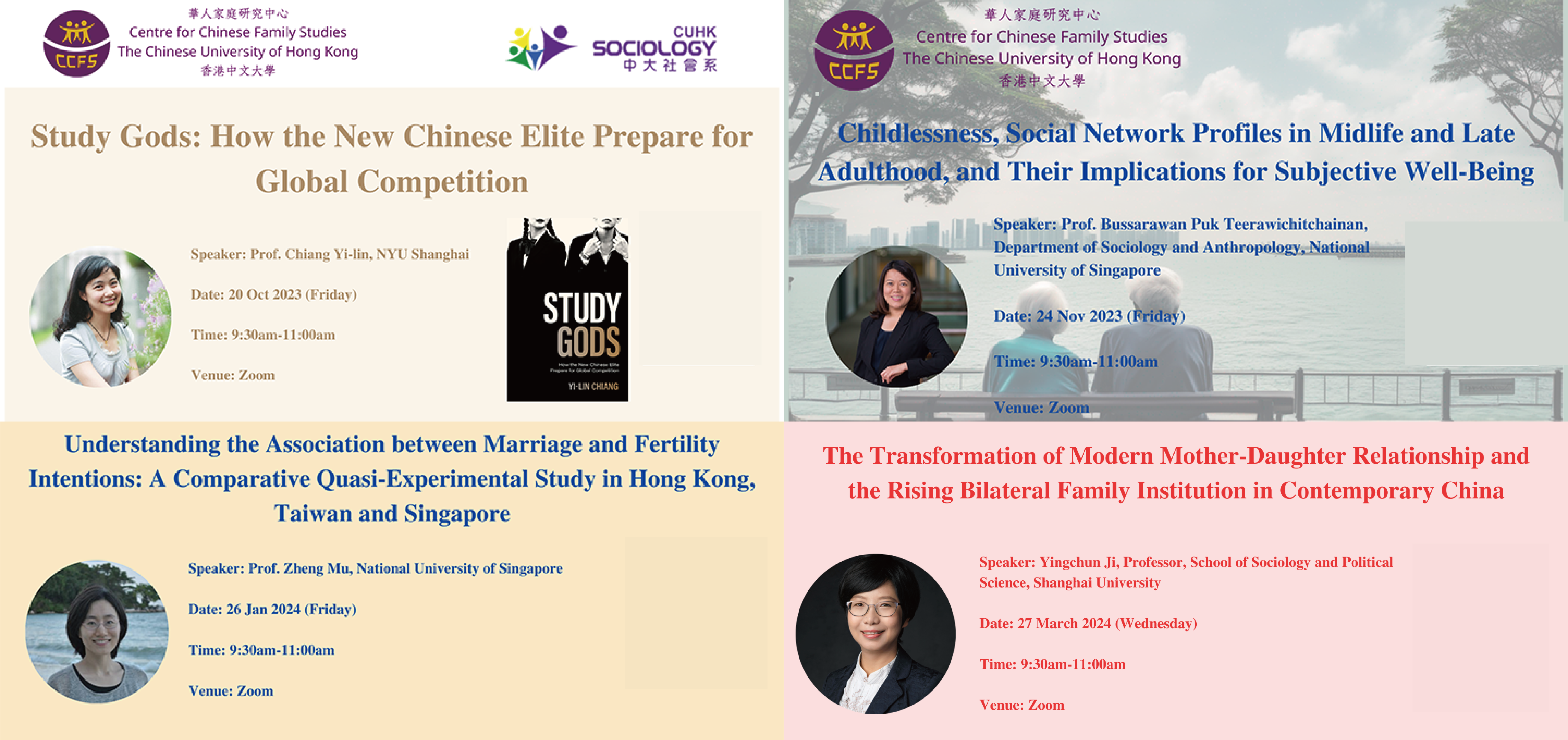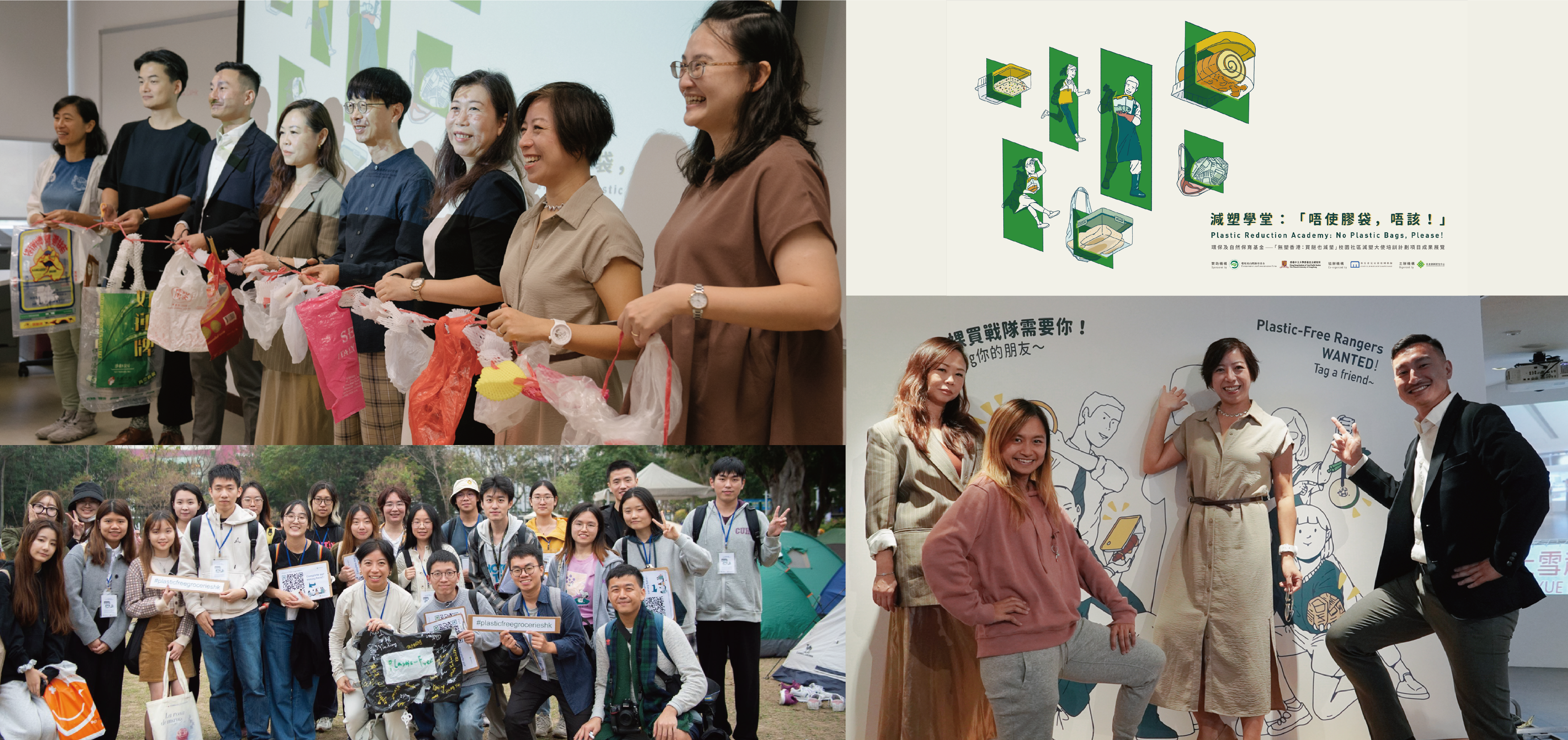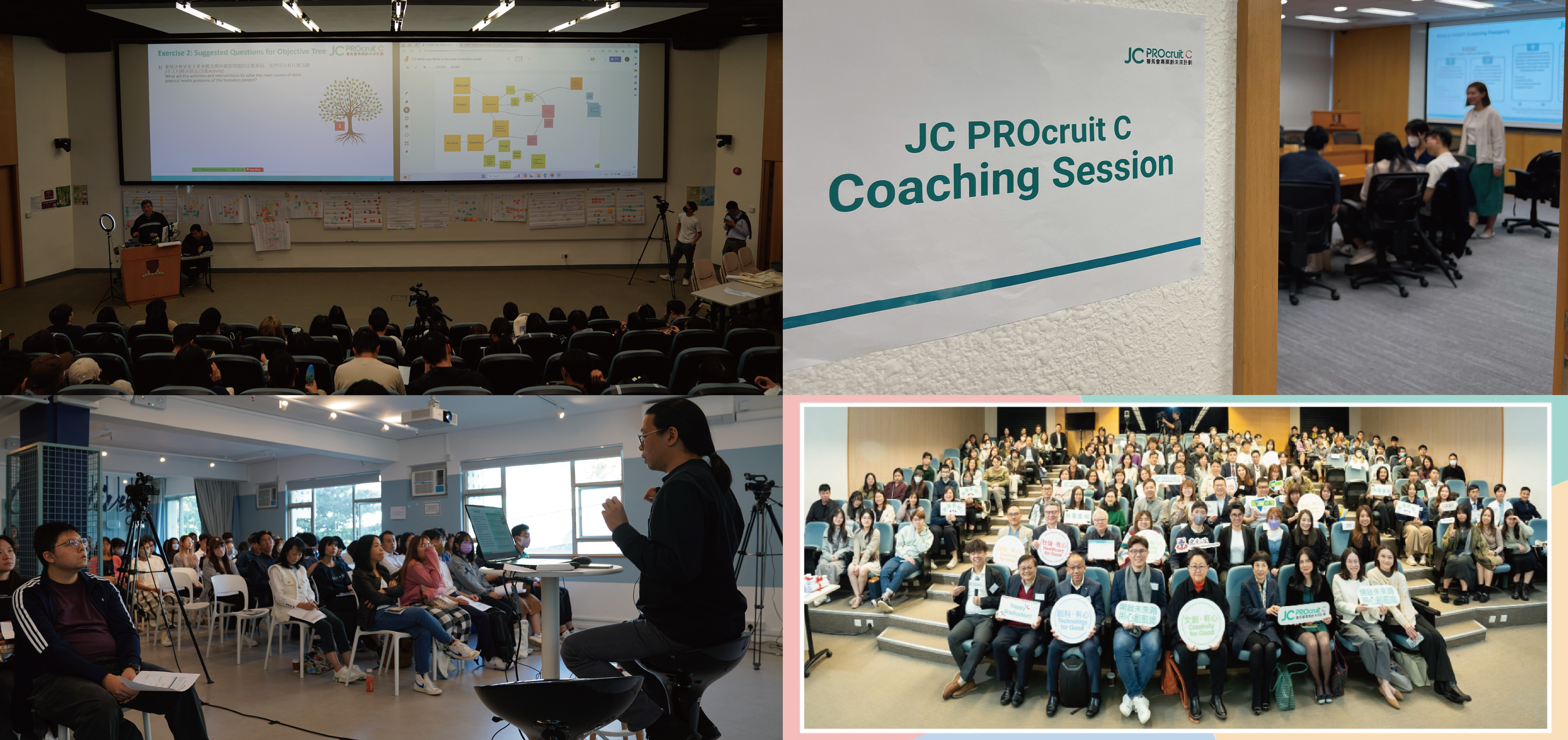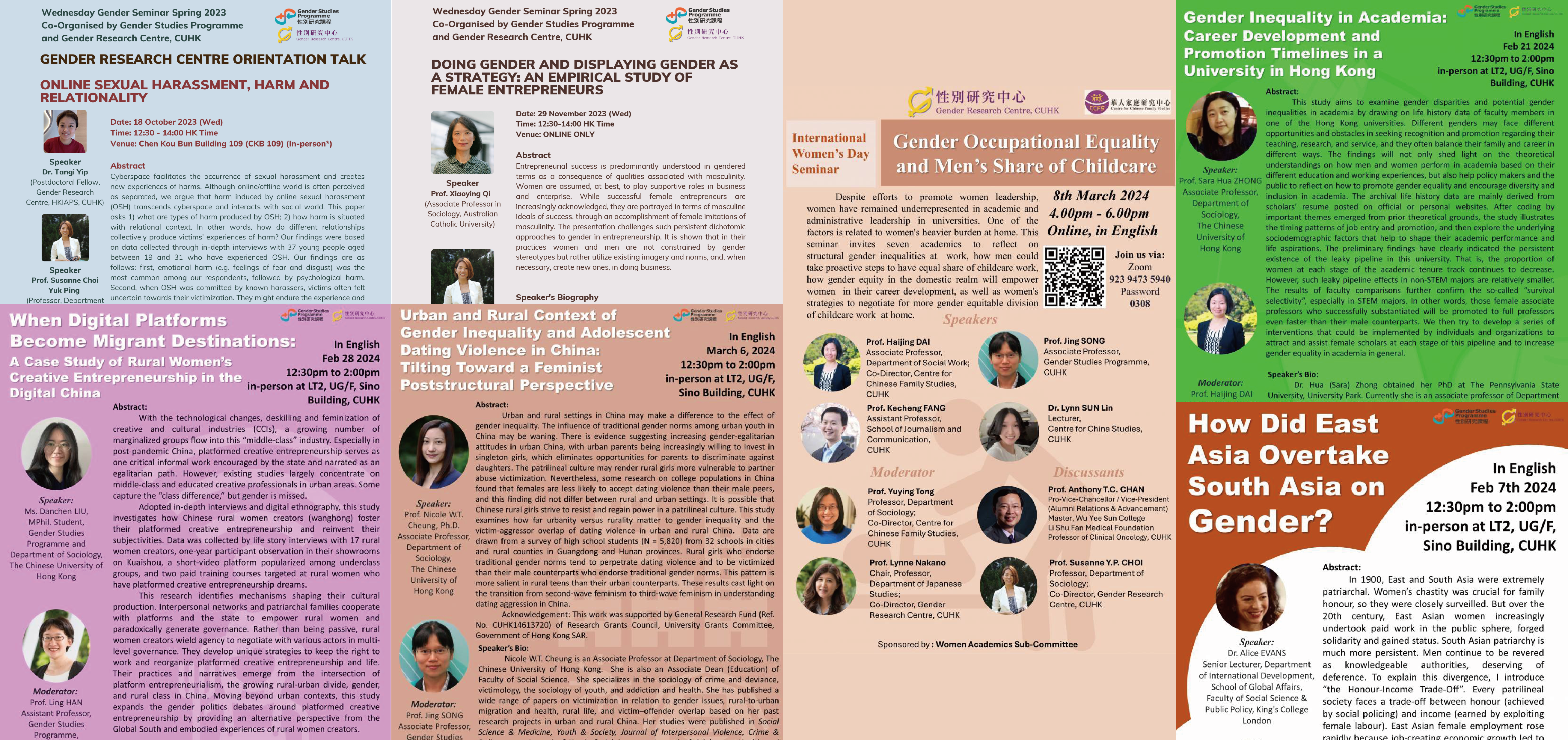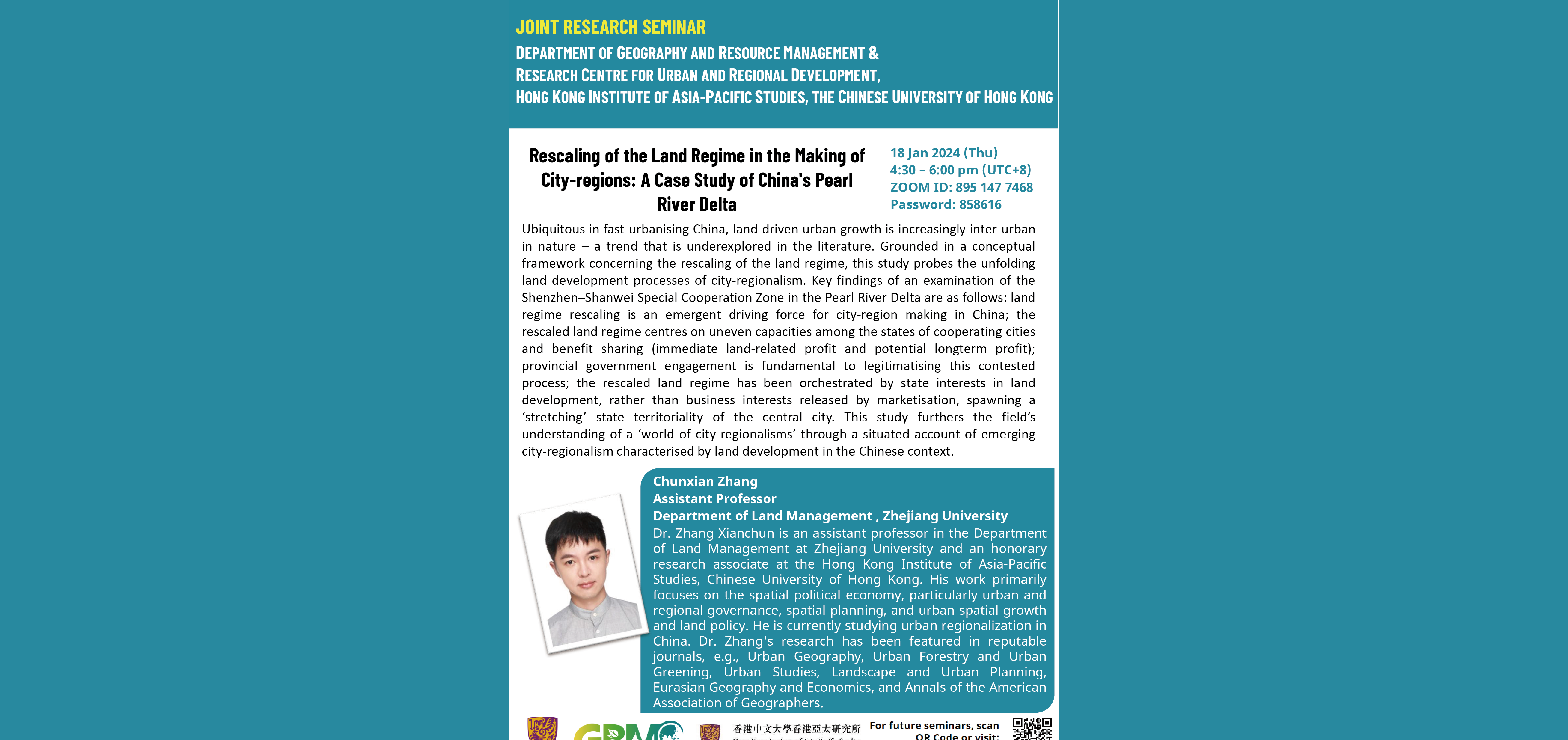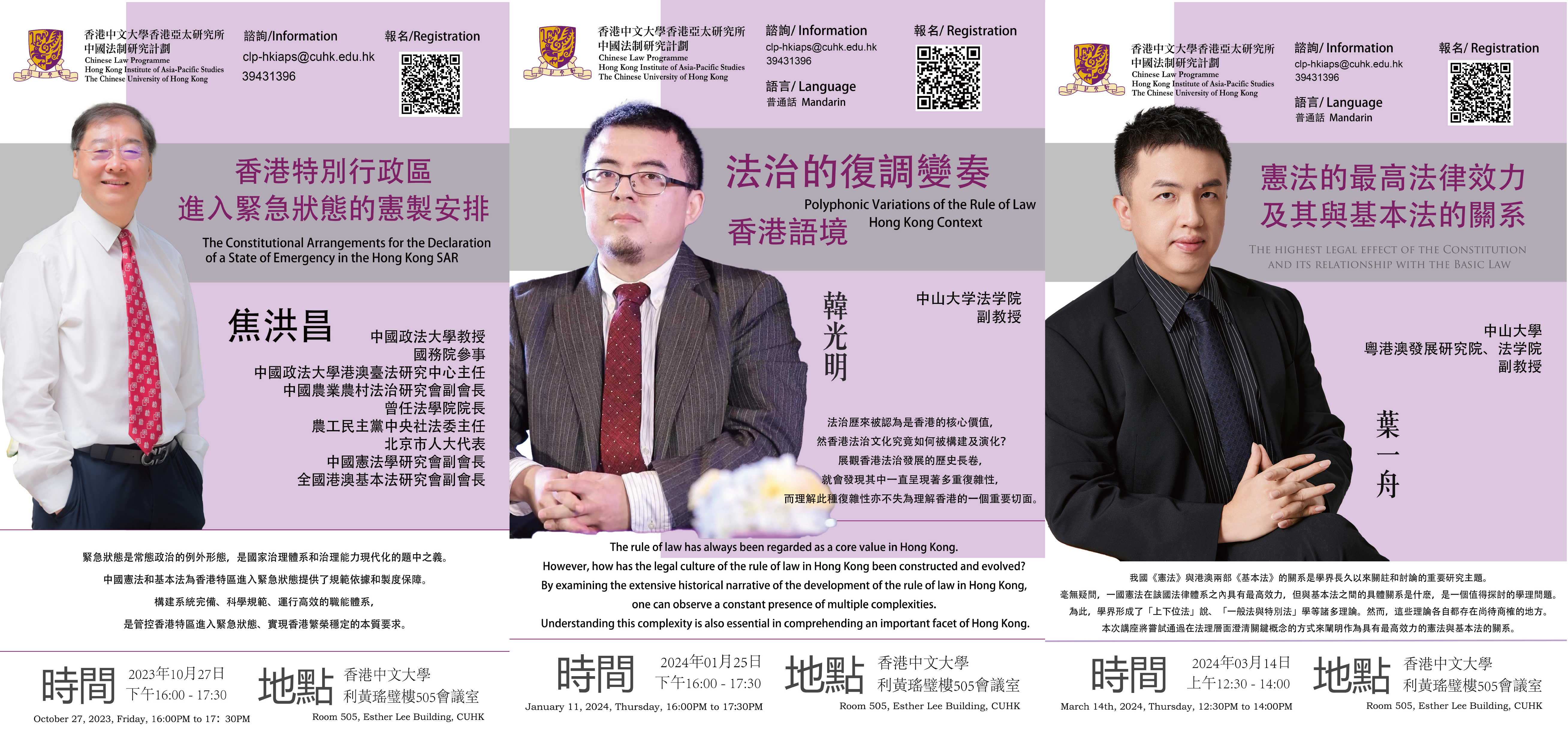
|
| Events |
|
|
| Centre for Chinese Family Studies |
Centre for Social Innovation Studies |
Centre for Youth Studies |
| Gender Research Centre | Research Centre for Urban and Regional Development |
Chinese Law Programme |
|
Centre for Chinese Family Studies
Study Gods: How the New Chinese Elite Prepare for Global Competition 09:30–11:00 | 20 October 2023 | Online |
|
|
Speaker
Dr Yi-lin Chiang |
Assistant Professor of Sociology, New York University Shanghai, China
|
|
Co-organizer
Department of Sociology, CUHK |
|
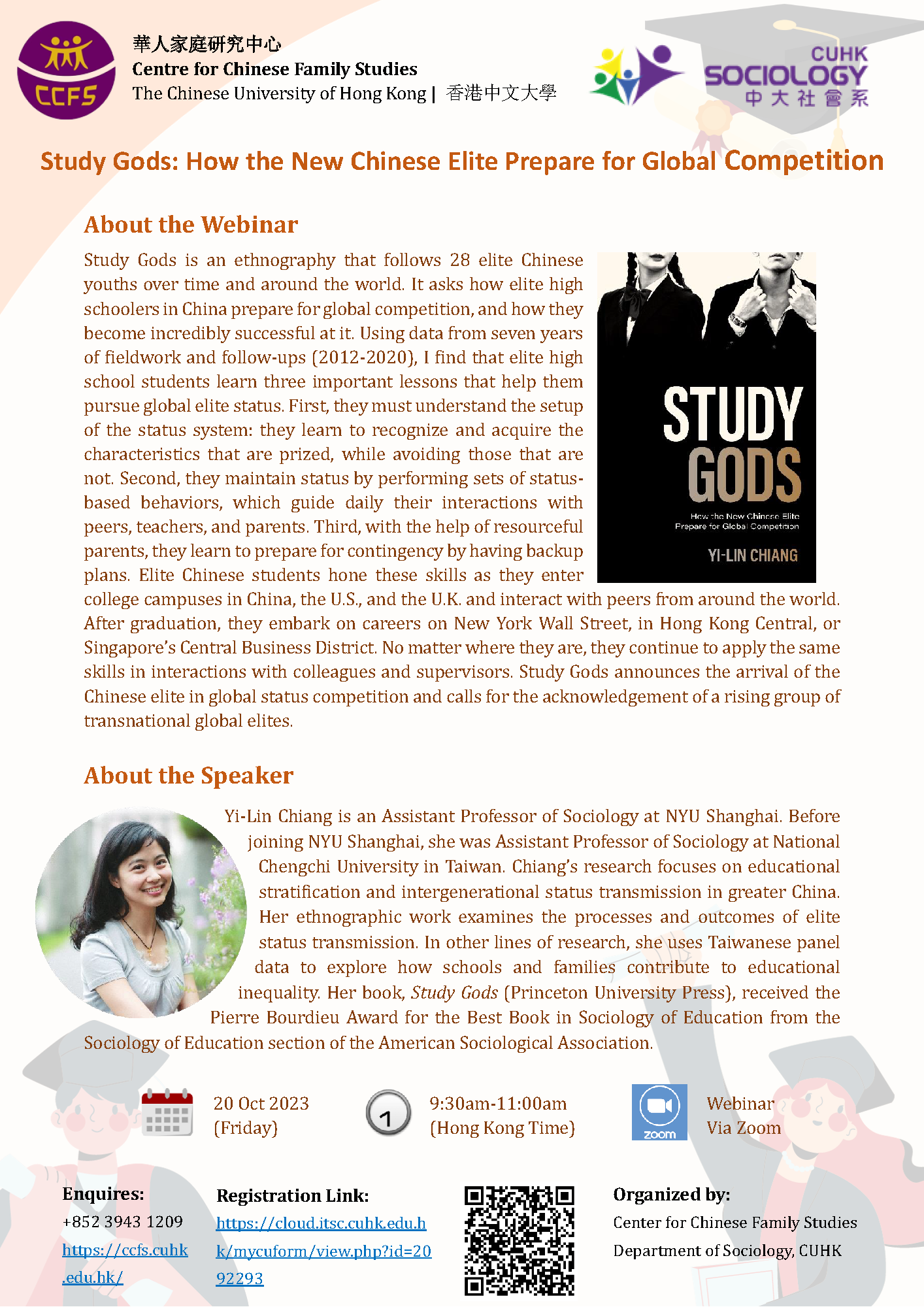 Study Gods is an ethnography that follows 28 elite Chinese youths over time and around the world.
It asks how elite high schoolers in China prepare for global competition, and how they become incredibly successful at it.
Using data from seven years of fieldwork and follow-ups (2012–2020),
the speaker find that elite high school students learn three important lessons that help them to pursue global elite status.
Study Gods is an ethnography that follows 28 elite Chinese youths over time and around the world.
It asks how elite high schoolers in China prepare for global competition, and how they become incredibly successful at it.
Using data from seven years of fieldwork and follow-ups (2012–2020),
the speaker find that elite high school students learn three important lessons that help them to pursue global elite status.First, they must understand the setup of the status system: They learn to recognize and acquire the characteristics that are prized, while avoiding those that are not. Second, they maintain status by performing sets of status-based behaviours, which daily guide their interactions with peers, teachers, and parents. Third, with the help of resourceful parents, they learn to prepare for contingencies by having backup plans. Elite Chinese students hone these skills as they enter college campuses in China, the US, and the UK, and interact with peers from around the world. After graduation, they embark on careers on New York’s Wall Street, in Hong Kong’s Central, or Singapore’s Central Business District. No matter where they are, they continue to apply the same skills in interactions with colleagues and supervisors. Study Gods announces the arrival of the Chinese elite in the competition for global status and calls for the acknowledgement of a rising group of transnational global elites. |
|
|
Childlessness, Social Network Profiles in Midlife and Late Adulthood,
and Their Implications for Subjective Well-Being 09:30–11:00 | 24 November 2023 | Online |
|
|
Speaker
Dr Bussarawan P. Teerawichitchainan |
Associate Professor, Department of Sociology and Anthropology,
National University of Singapore |
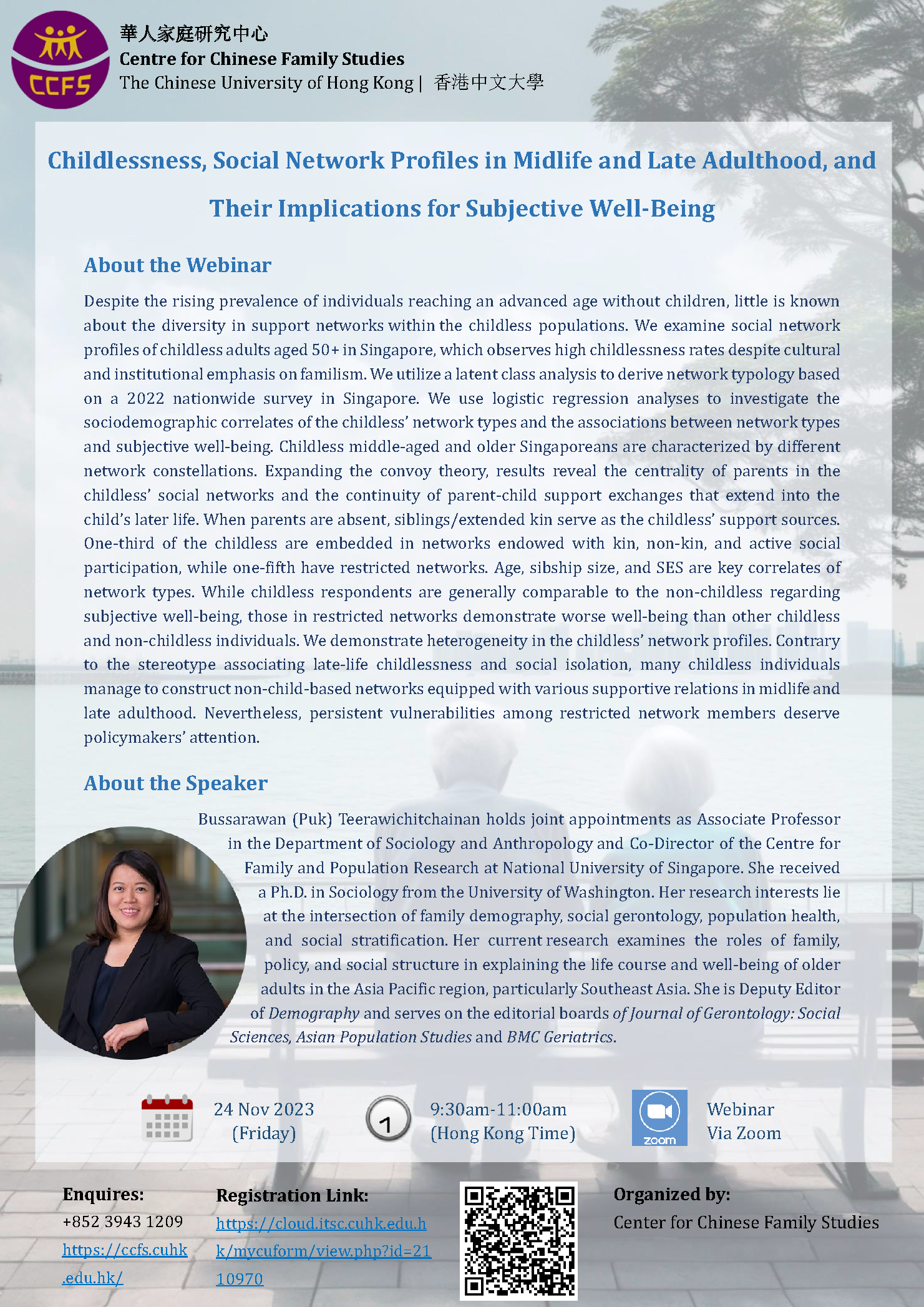 Despite the rising prevalence of individuals reaching an advanced age without children,
little is known about the diversity in support networks within childless populations.
Dr Teerawichitchainan and her research team examined social network profiles of childless adults aged 50 or above in Singapore,
where rates of childlessness are high despite a cultural and institutional emphasis on familism.
A latent class analysis was used to derive a network typology based on a 2022 nationwide survey in Singapore.
Logistic regression analyses were employed to investigate the sociodemographic correlates of the types of networks that childless people have and the associations between network types and subjective well-being.
Childless middle-aged and older Singaporeans have different network constellations than their non-childless peers.
Despite the rising prevalence of individuals reaching an advanced age without children,
little is known about the diversity in support networks within childless populations.
Dr Teerawichitchainan and her research team examined social network profiles of childless adults aged 50 or above in Singapore,
where rates of childlessness are high despite a cultural and institutional emphasis on familism.
A latent class analysis was used to derive a network typology based on a 2022 nationwide survey in Singapore.
Logistic regression analyses were employed to investigate the sociodemographic correlates of the types of networks that childless people have and the associations between network types and subjective well-being.
Childless middle-aged and older Singaporeans have different network constellations than their non-childless peers.Expanding the convoy theory, the results reveal the centrality of parents in the social networks of the childless, and the continuity of parent-child support exchanges that extend into the child’s later life. When parents are absent, siblings/extended kin serve as sources of support for the childless. One-third of the childless are embedded in networks involving kin, non-kin, and active social participation, while one-fifth have restricted networks. Age, sibship size, and SES are key correlates of network types. While childless respondents are generally comparable to the non-childless in subjective well-being, those in restricted networks demonstrate worse well-being than other childless and non-childless individuals. Contrary to the stereotype associating late-life childlessness and social isolation, many childless individuals manage to construct non-child-based networks equipped with various supportive relations in midlife and late adulthood. Nevertheless, persistent vulnerabilities among restricted network members deserve policymakers’ attention. |
|
|
Speaker
Dr Zheng Mu |
Assistant Professor, Department of Sociology and Anthropology,
National University of Singapore |
|
Co-organizer
Department of Sociology, CUHK |
|
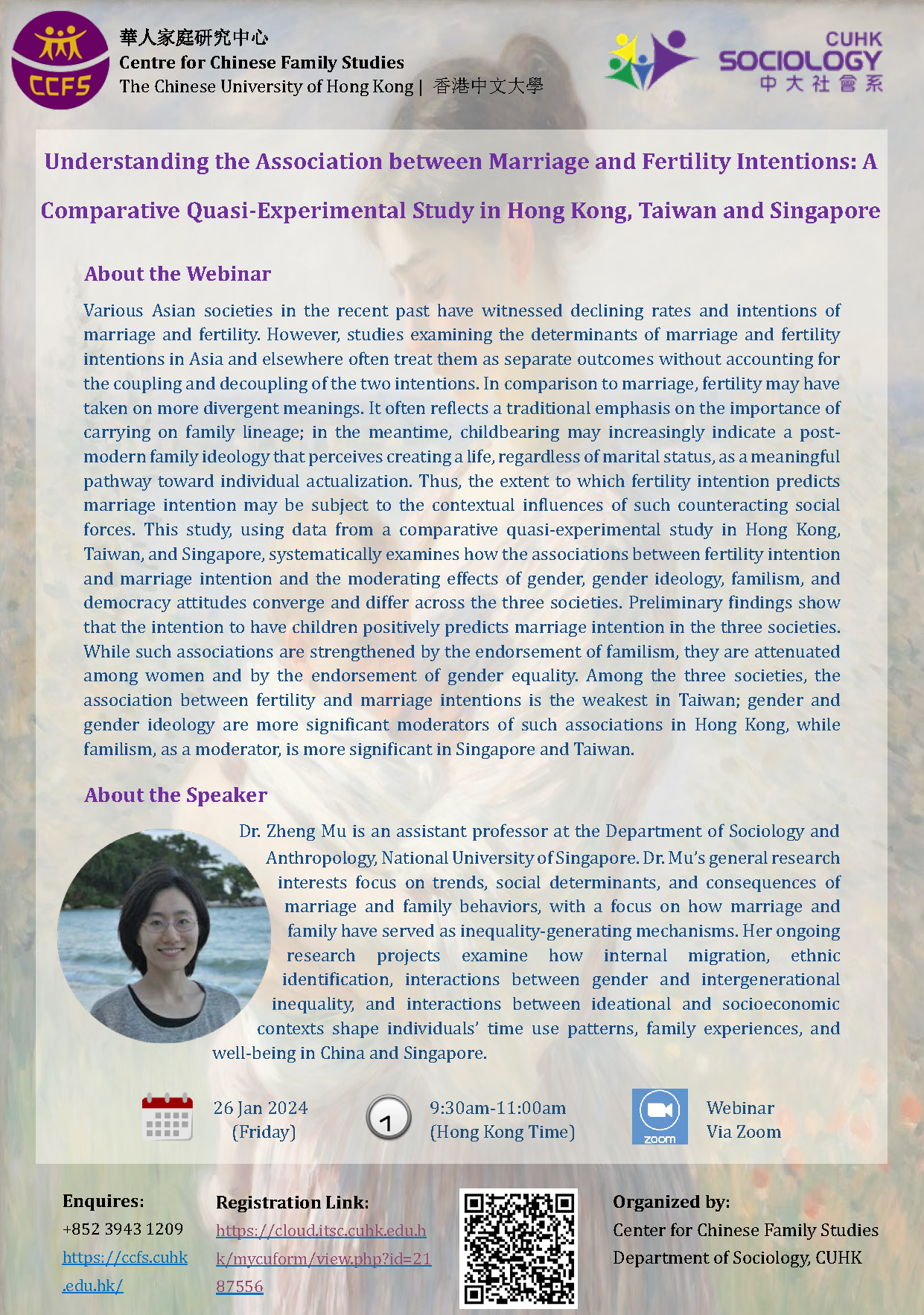 Various Asian societies in the recent past have witnessed declining rates and plans for marriage and fertility.
However, studies examining the determinants of marriage and fertility intentions in Asia and elsewhere often treat the two intentions as separate outcomes without accounting for their coupling and decoupling.
In comparison to marriage, fertility may have taken on more divergent meanings. It often reflects a traditional emphasis on the importance of carrying on the family’s lineage;
in the meantime, childbearing may increasingly indicate a post-modern family ideology that perceives the creation of life,
regardless of marital status, as a meaningful pathway toward individual actualization.
Thus, the extent to which fertility intention predicts marriage intention may be subject to the contextual influences of such counteracting social forces.
Various Asian societies in the recent past have witnessed declining rates and plans for marriage and fertility.
However, studies examining the determinants of marriage and fertility intentions in Asia and elsewhere often treat the two intentions as separate outcomes without accounting for their coupling and decoupling.
In comparison to marriage, fertility may have taken on more divergent meanings. It often reflects a traditional emphasis on the importance of carrying on the family’s lineage;
in the meantime, childbearing may increasingly indicate a post-modern family ideology that perceives the creation of life,
regardless of marital status, as a meaningful pathway toward individual actualization.
Thus, the extent to which fertility intention predicts marriage intention may be subject to the contextual influences of such counteracting social forces. Using data from a comparative quasi-experimental study in Hong Kong, Taiwan, and Singapore, Dr Mu and her team systematically examine how the associations between fertility intention and marriage intention, and the moderating effects of gender, gender ideology, familism, and democracy attitudes converge and differ across the three societies. Preliminary findings show that the intention to have children positively predicts marriage intention in the three societies. While such associations are strengthened by the endorsement of familism, they are attenuated among women and by the endorsement of gender equality. Among the three societies, the association between fertility and marriage intentions is weakest in Taiwan; gender and gender ideology are more significant moderators of such associations in Hong Kong; while familism, as a moderator, is more significant in Singapore and Taiwan. |
|
|
International Women’s Day Seminar: Gender Occupational Equality and Men’s Share of Childcare
16:00–18:00 | 8 March 2024 | LT2, UG/F, Sino Building, CUHK |
|
|
Speakers
Prof. Haijing Dai |
Co-Director, Centre for Chinese Family Studies, HKIAPS, CUHK |
|
Prof. Jing Song
|
Associate Professor, Gender Studies Programme, CUHK
|
|
Prof. Kecheng Fang
|
Assistant Professor, School of Journalism and Communication, CUHK
|
|
Dr Lynn L. Sun
|
Lecturer, Centre for China Studies, CUHK
|
|
Discussants
Prof. Anthony T. C. Chan |
Pro-Vice-Chancellor (Alumni Relations & Advancement), CUHK |
|
Prof. Lynne Nakano
|
Co-Director, Gender Research Centre, HKIAPS, CUHK
|
|
Prof. Susanne Y. P. Choi
|
Co-Director, Gender Research Centre, HKIAPS, CUHK
|
|
Moderator
Prof. Yuying Tong |
Co-director, Centre for Chinese Families Studies, HKIAPS, CUHK
|
|
Co-organizer
Gender Research Centre, HKIAPS, CUHK |
|
|
Sponsor
Women Academics Sub-Committee, CUHK |
|
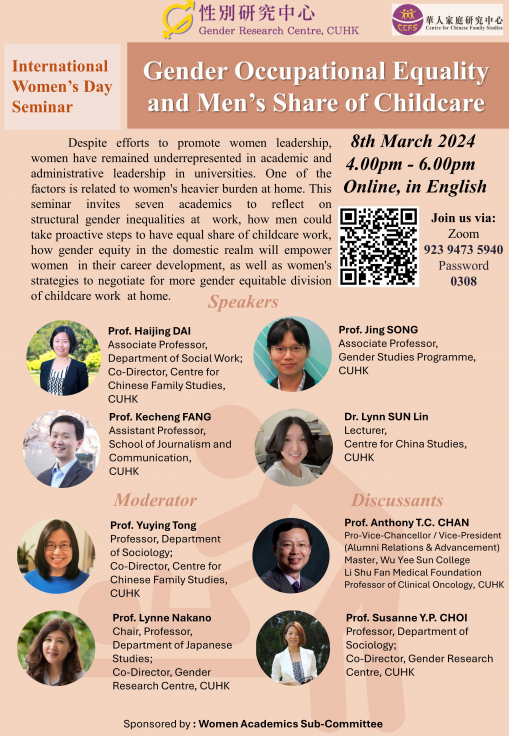 Despite efforts to promote female leadership,
women remain underrepresented in academic and administrative leadership positions in universities.
One reason for this is the heavier burden that women shoulder at home compared to men.
This seminar invites seven academics to reflect on structural gender inequalities at work,
how men could take proactive steps to shoulder an equal share of the childcare work,
how gender equity in the domestic realm will empower women in their career development,
as well as strategies that women can take to negotiate a more gender-equitable division of childcare work at home.
Despite efforts to promote female leadership,
women remain underrepresented in academic and administrative leadership positions in universities.
One reason for this is the heavier burden that women shoulder at home compared to men.
This seminar invites seven academics to reflect on structural gender inequalities at work,
how men could take proactive steps to shoulder an equal share of the childcare work,
how gender equity in the domestic realm will empower women in their career development,
as well as strategies that women can take to negotiate a more gender-equitable division of childcare work at home. |
|
|
The Transformation of Modern Mother-Daughter Relationship and
the Rising Bilateral Family Institution in Contemporary China 09:30–11:00 | 27 March 2024 | Online |
|
|
Speaker
Prof. Yingchun Ji |
Professor, School of Sociology and Political Science,
Shanghai University, China |
|
Co-organizer
Department of Sociology, CUHK |
|
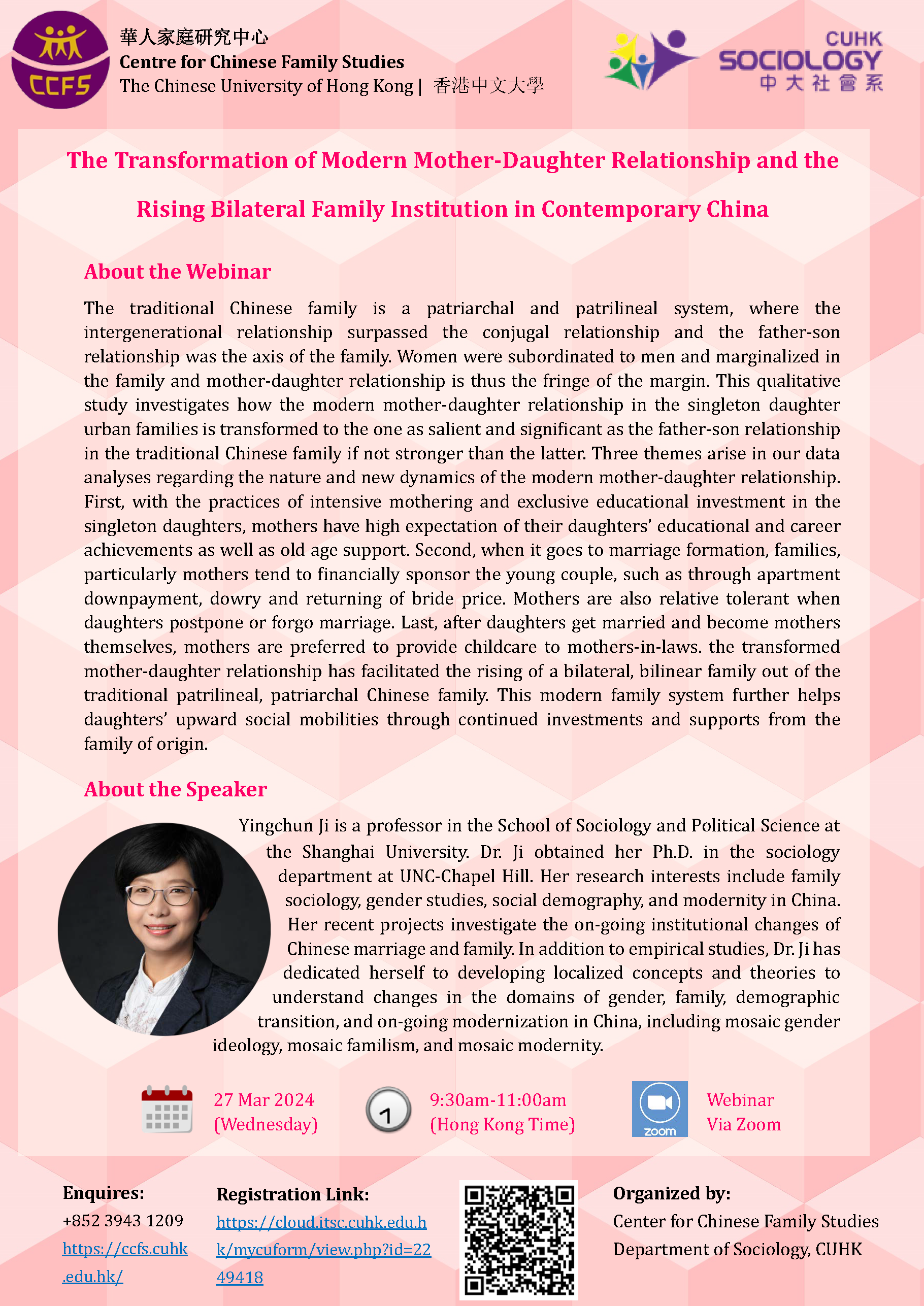 The traditional Chinese family was a patriarchal and patrilineal system,
where the intergenerational relationship superseded the conjugal relationship and the father-son relationship was the axis of the family.
Women were subordinated to men and marginalized in the family;
thus, the mother-daughter relationship was relegated to the fringes of the family system.
The traditional Chinese family was a patriarchal and patrilineal system,
where the intergenerational relationship superseded the conjugal relationship and the father-son relationship was the axis of the family.
Women were subordinated to men and marginalized in the family;
thus, the mother-daughter relationship was relegated to the fringes of the family system.Through a qualitative study, Prof. Yingchun Ji investigated how the mother-daughter relationship in modern, singleton daughter urban families has been transformed to the one as salient and significant as the father-son relationship in the traditional Chinese family, to become as strong, if not stronger, than the latter. Three themes arise in our analyses of the data on the nature and new dynamics of modern mother-daughter relationships. First, with the practices of intensive mothering and exclusive educational investment in their singleton daughter, mothers have high expectations for their daughter in terms of educational and career achievements, as well as support in their old age. Second, with regard to marriage formation, families, particularly mothers, tend to financially sponsor the young couple, such as through providing a down payment for the purchase of an apartment, a dowry, and the returning of the bride price. Mothers are also relatively tolerant when their daughter postpones or forgoes marriage. Last, after a daughter marries and becomes a mother herself, mothers are preferred to mothers-in-law in the provision of childcare. The transformation of the mother-daughter relationship has facilitated the rise of a bilateral, bilinear family from the traditional, patrilineal, patriarchal Chinese family. This modern family system further helps daughters to achieve upward social mobility through continued investments and support from their family of origin. |
|
|
Centre for Social Innovation Studies
“Plastic Reduction Academy: No Plastic Bag, please!” Public Talk and Opening Ceremony 9 November 2023 | Jockey Club Museum of Climate Change, CUHK |
|
|
Speaker
Prof. Ka-ming Wu |
Director, Centre for Social Innovation Studies, HKIAPS |
|
Co-organizer
CUHK Jockey Club Museum of Climate Change |
|
|
Sponsors
Environment and Conservation Fund, HKSAR Government HKIAPS |
|
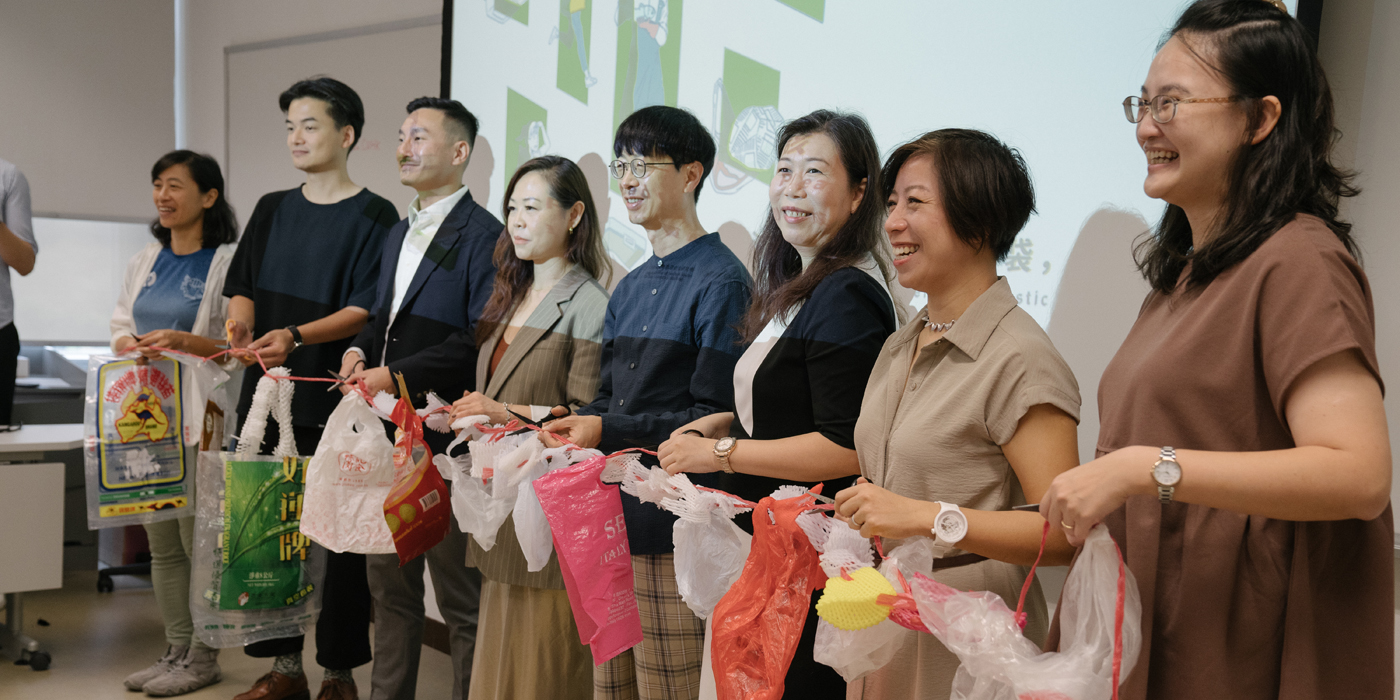 The opening ceremony of the exhibition featured representatives from the Environment and Conservation Fund,
the Hong Kong Institute of Asia-Pacific Studies at CUHK, Greenpeace East Asia, and The Earth Green.
The participants emphasized that the project aligns with the forthcoming implementation of legislation on disposable plastics by the Hong Kong government,
underscoring CUHK’s commitment to reducing the use of plastics.
It also incorporates plastic reduction into the inclusive and diverse lens of cultural studies,
offering a humanistic perspective for advancing the development of Sustainable Development Goals (SDG).
The opening ceremony of the exhibition featured representatives from the Environment and Conservation Fund,
the Hong Kong Institute of Asia-Pacific Studies at CUHK, Greenpeace East Asia, and The Earth Green.
The participants emphasized that the project aligns with the forthcoming implementation of legislation on disposable plastics by the Hong Kong government,
underscoring CUHK’s commitment to reducing the use of plastics.
It also incorporates plastic reduction into the inclusive and diverse lens of cultural studies,
offering a humanistic perspective for advancing the development of Sustainable Development Goals (SDG). |
|
|
“Plastic Reduction Academy: No Plastic Bag, Please!” Public Exhibition
2–28 November 2023 | Jockey Club Museum of Climate Change, CUHK |
|
|
Sponsors
Environment and Conservation Fund, HKSAR Government HKIAPS |
|
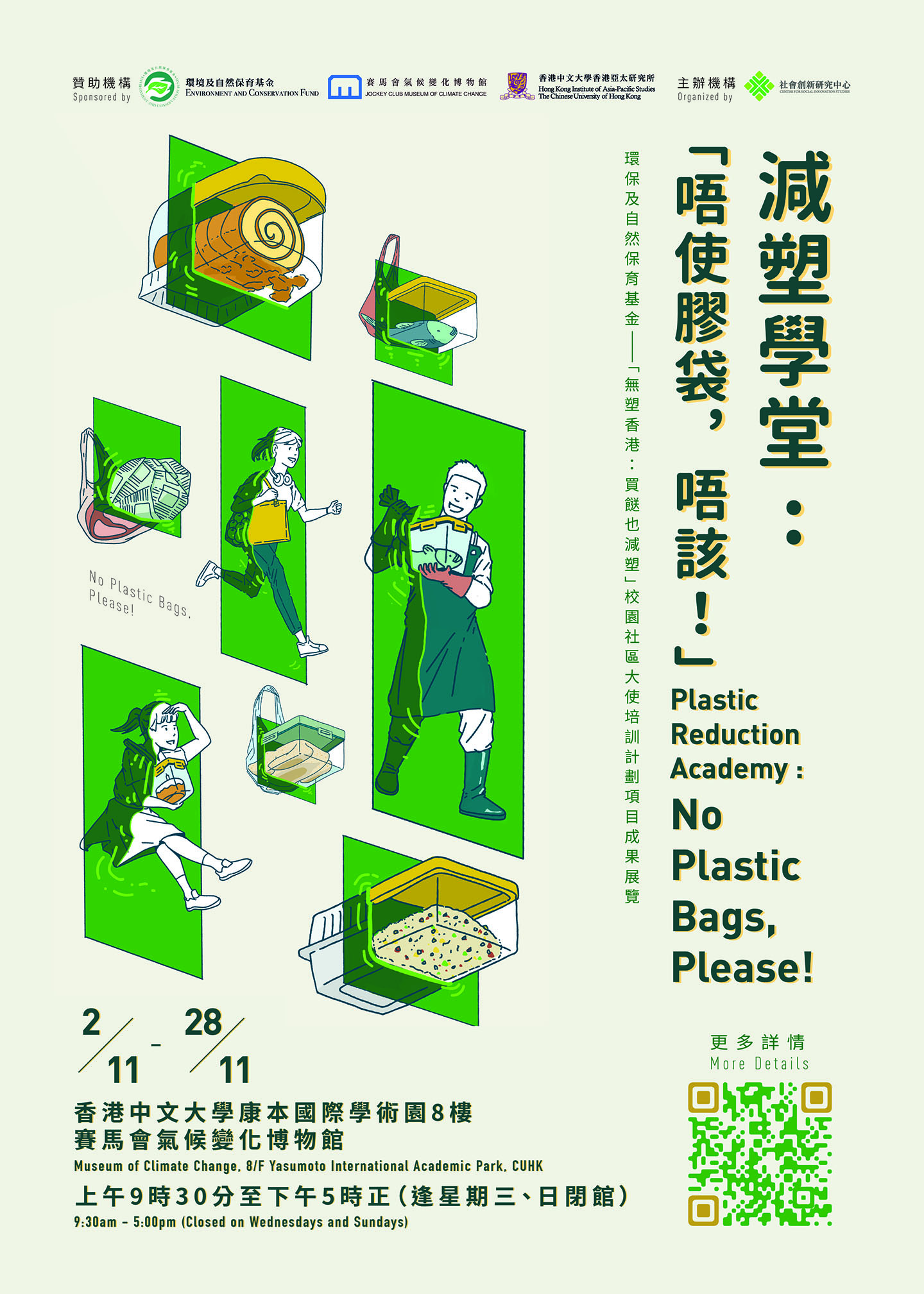 “Plastic-Free Hong Kong: Plastic Reduction in Wet Markets” is a student community ambassador training scheme.
The programme lasted for one year.
CSIS invited local and international environmental organizations, university and secondary school students, market vendors,
and the public to broaden our understanding of the use of plastic in Hong Kong, through workshops,
field visits to wet markets, and creative art activities.
“Plastic-Free Hong Kong: Plastic Reduction in Wet Markets” is a student community ambassador training scheme.
The programme lasted for one year.
CSIS invited local and international environmental organizations, university and secondary school students, market vendors,
and the public to broaden our understanding of the use of plastic in Hong Kong, through workshops,
field visits to wet markets, and creative art activities.The “Changemakers” workshop provided university students with training on plastic reduction. The field trip took secondary students to the Sha Tin Market to experience the use of plastic shopping bags in the wet market. Secondary school students also participated in an art workshop to reflect on plastic pollution. CSIS believes that the flow of plastic is cross-cultural, and endeavours to shed light on plastic reduction from a cultural perspective. In this exhibition, we present stories from our one-year project through the collected work of students, and invite the public to take part in this dialogue between the environmental sciences, arts, and humanities. For details: |
|
|
Environmental Screening X Field Studies @Central
28 January & 4 February 2024 | Central and Causeway Bay, Hong Kong |
|
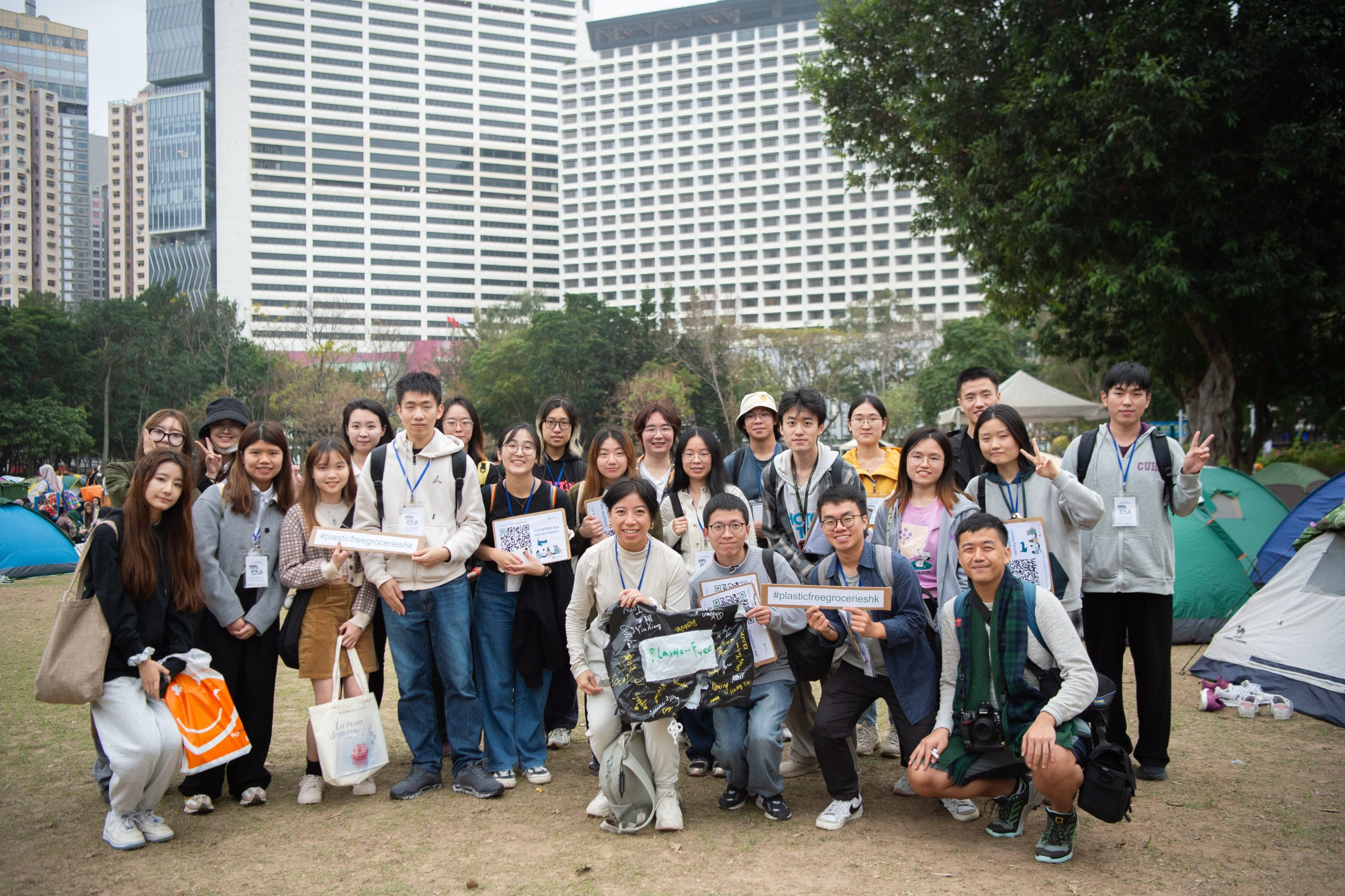 Following the beach clean-up on Lamma Island and the design thinking workshop,
the “Plastic-free together” project now moved to the “fieldwork” stage.
On 28 January and 4 February,
students visited Central Park and Victoria Park to engage in a cross-cultural dialogue with domestic helpers through film screenings and questionnaire interviews.
Following the beach clean-up on Lamma Island and the design thinking workshop,
the “Plastic-free together” project now moved to the “fieldwork” stage.
On 28 January and 4 February,
students visited Central Park and Victoria Park to engage in a cross-cultural dialogue with domestic helpers through film screenings and questionnaire interviews.Through screening videos depicting the cross-cultural journey of plastic waste in the Philippines and India, students and domestic helpers will collectively explore the impact of plastics in different places. Students will then conduct questionnaire interviews and dialogues with the helpers to understand their knowledge and behaviour related to plastic use: When do they most commonly use plastic bags? What do they think of the forthcoming Municipal Solid Waste Charging scheme? What challenges do we all face in reducing plastic use? |
|
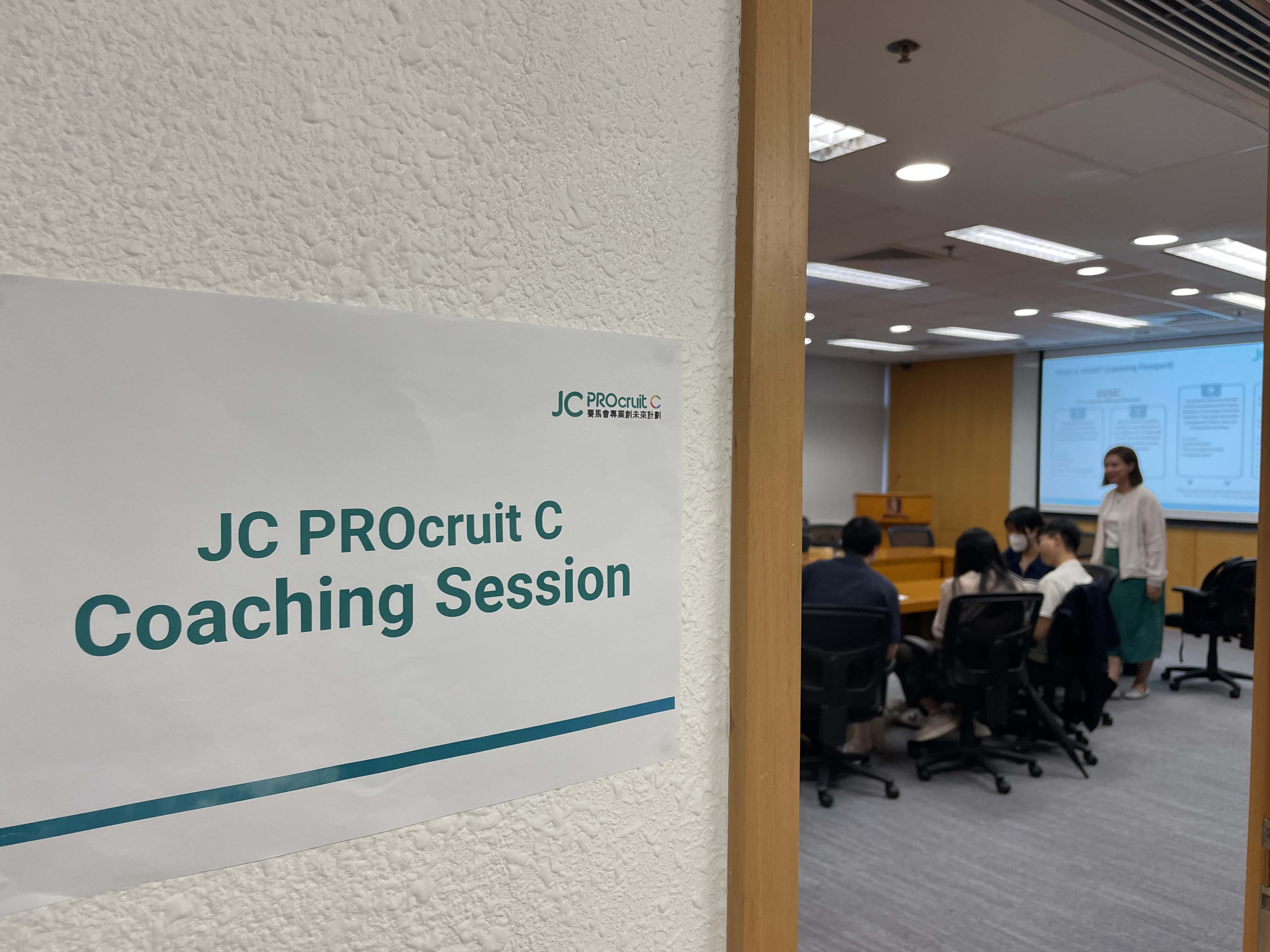 Event dates:
Event dates:18–20 & 26–27 October 2023 2–3 November 2023 6–8 & 14–15 December 2023 4–5 January 2024 31 January 2024 – 2 February 2024 22–23 February 2024 10-12 April 2024 5-7 June 2024 Talent development experts along with JC PROcruit C’s partners have jointly designed six coaching sessions for more than 500 first-time job-seekers in three cohorts. The continuous coaching gives trainees a shot in the arm in developing their career. The sessions are offered under the themes of work transition, work values & attitudes, personal effectiveness, workplace communication, interpersonal relationships, and career planning. The bi-monthly sessions provide regular meet-ups for peer sharing and listening to workplace experiences under the guidance of a career coach, giving trainees opportunities to receive mutual emotional support, reflect together, and contribute different perspectives to handle challenges. | |
|
JC PROcruit C Social Innovation Workshop 1
15:00–18:00 | 16 & 23 November 2023 | Online (16 Nov); Room UGA, Innoport, CUHK (23 Nov) |
|
|
Speakers
Dr Terence Yuen |
Founder and Executive Director, Hong Kong Institute of Social Impact Analysts |
|
Moderators
Prof. Anthony Y. H. Fung |
Director, Hong Kong Institute of Asia-Pacific Studies, CUHK
|
|
Prof. Winton Au
|
Deputy Director, Centre for Youth Studies, HKIAPS, CUHK
|
|
Co-organizer
Centre for Social Innovations, HKIAPS, CUHK |
|
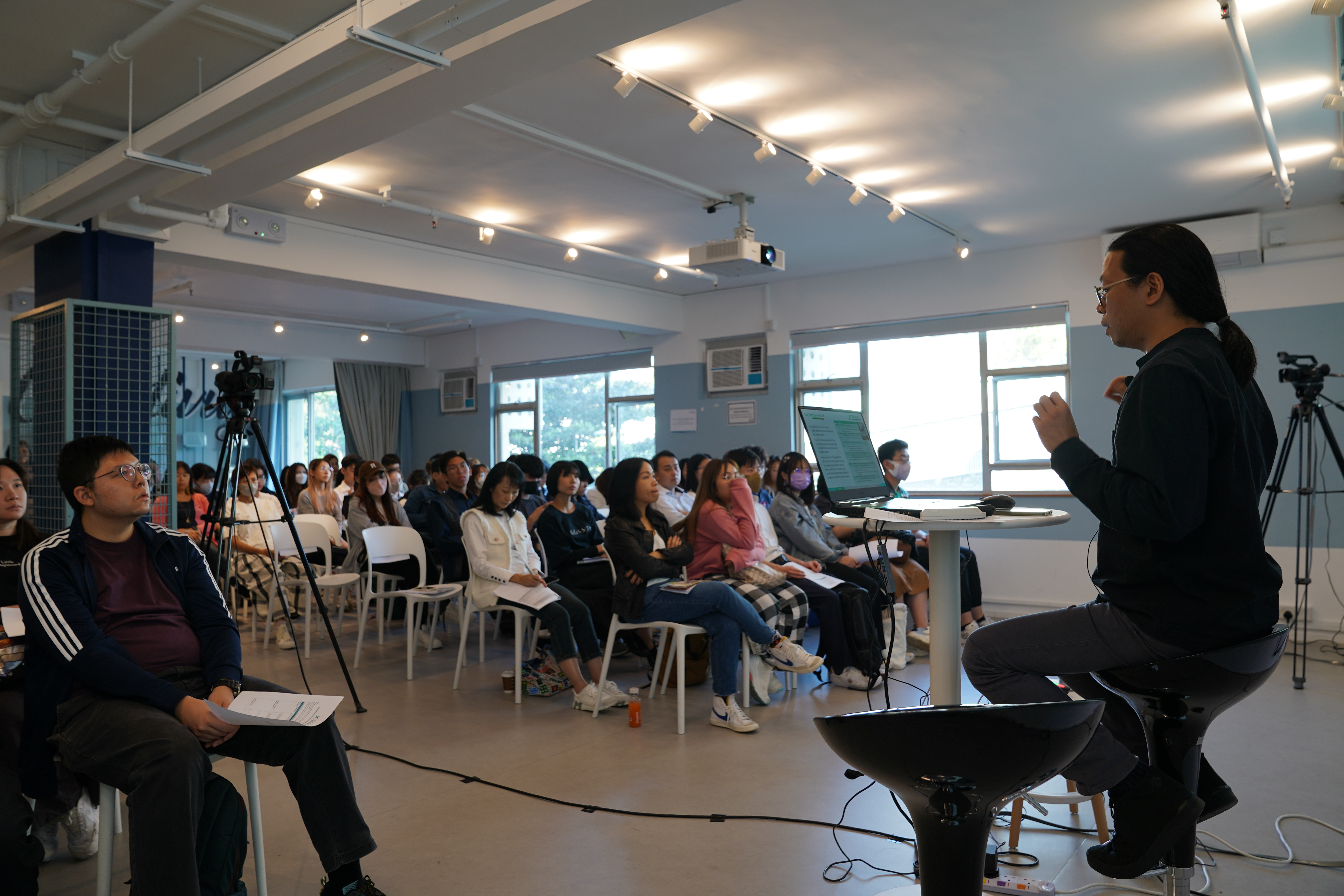 This was part of an online course delivered to help first-time jobseekers delve deeper into the world of social innovation.
Social innovators and entrepreneurs walked through the 5W1H of social innovation:
WHAT it is, WHY it is important, WHO social innovators are, WHERE it can happen,
and HOW you can be part of the change.
Social innovation concepts and tools were illustrated to guide participants to think and discuss how to help those involved in a social innovation project achieve impacts relating to corporate social responsibility (CSR) and sustainable development goals (SDGs),
turning risks into opportunities from COVID to the post-COVID era.
This was part of an online course delivered to help first-time jobseekers delve deeper into the world of social innovation.
Social innovators and entrepreneurs walked through the 5W1H of social innovation:
WHAT it is, WHY it is important, WHO social innovators are, WHERE it can happen,
and HOW you can be part of the change.
Social innovation concepts and tools were illustrated to guide participants to think and discuss how to help those involved in a social innovation project achieve impacts relating to corporate social responsibility (CSR) and sustainable development goals (SDGs),
turning risks into opportunities from COVID to the post-COVID era.
| |
|
JC PROcruit C Social Innovation Workshop 2
15:00–18:00 | 5 October 2023, 12 & 19 March 2024 | Online (5 Oct 2023 & 19 Mar 2024); LT3, Yasumoto International Academic Park, CUHK (12 Mar 2024) |
|
|
Speakers
Prof. Hung Wong |
Associate Professor, Department of Social Work, CUHK |
|
Moderator
Prof. Anthony Y. H. Fung |
Director, Hong Kong Institute of Asia-Pacific Studies, CUHK
|
|
Prof. Winton Au
|
Deputy Director, Centre for Youth Studies, HKIAPS, CUHK
|
|
Co-organizer
Centre for Social Innovations, HKIAPS, CUHK |
|
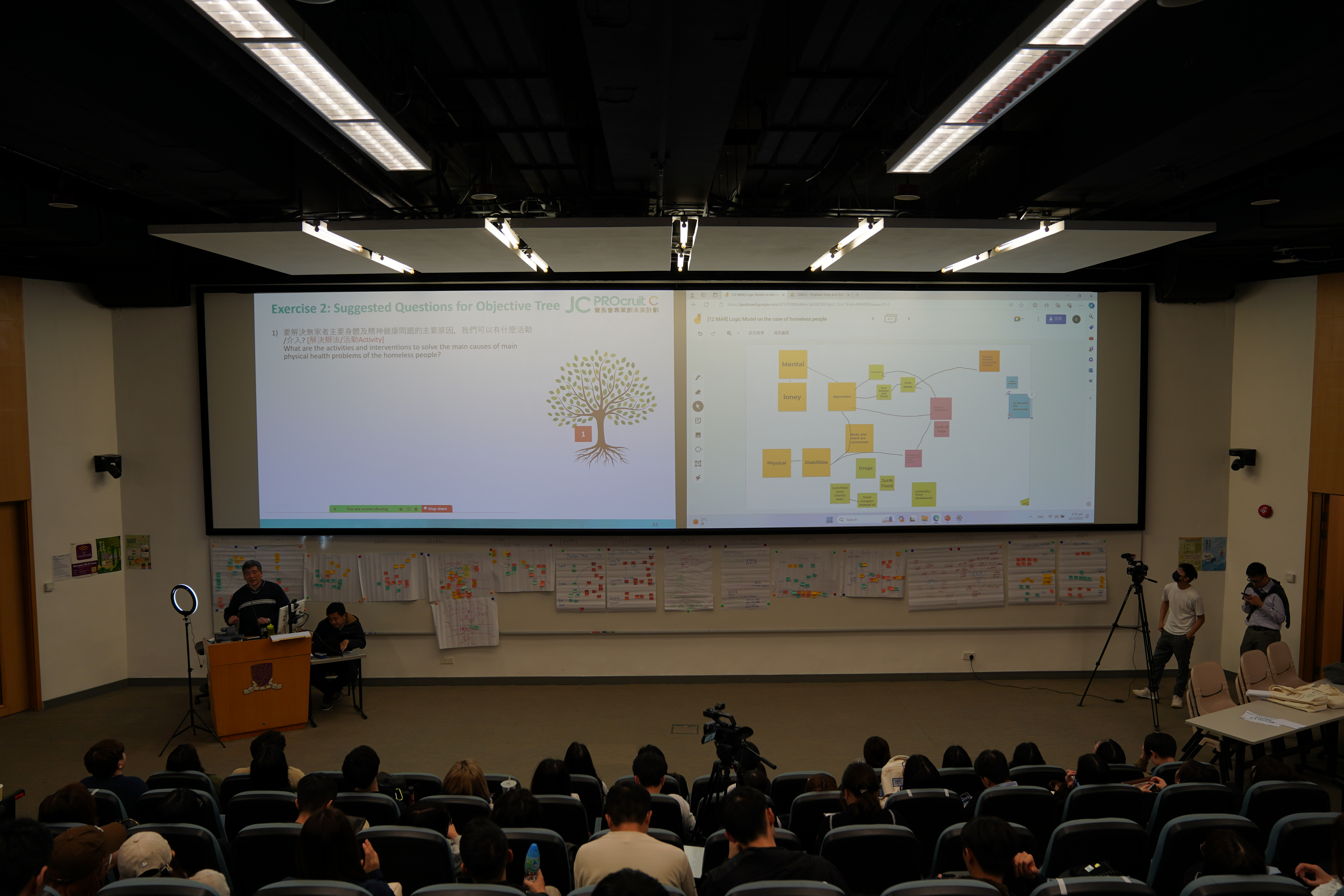 The workshop provided a refresher on social innovation concepts and illustrated the practical application of social innovation tools through various case studies and discussions.
The physical and mental health issues faced by homeless people in Hong Kong were introduced as a case study and participants were encouraged to reflect more on social issues.
The tools and frameworks for defining the causes of an issue were introduced,
along with the objectives of an intervention, and how to manage and measure impact.
The trainees were encouraged to apply these tools in their work.
Through studying some examples of social innovation entrepreneurship stories,
The workshop provided a refresher on social innovation concepts and illustrated the practical application of social innovation tools through various case studies and discussions.
The physical and mental health issues faced by homeless people in Hong Kong were introduced as a case study and participants were encouraged to reflect more on social issues.
The tools and frameworks for defining the causes of an issue were introduced,
along with the objectives of an intervention, and how to manage and measure impact.
The trainees were encouraged to apply these tools in their work.
Through studying some examples of social innovation entrepreneurship stories,
participants practised group exercises on coming up with solutions to the social problems of homeless people. |
|
|
JC PROcruit C Graduation Ceremony
8 January & 7 March 2024 | LT4,Wong Fuk Yuen Building (8 January); LT5, Yasumoto International Academic Park, CUHK (7 March 2024) |
|
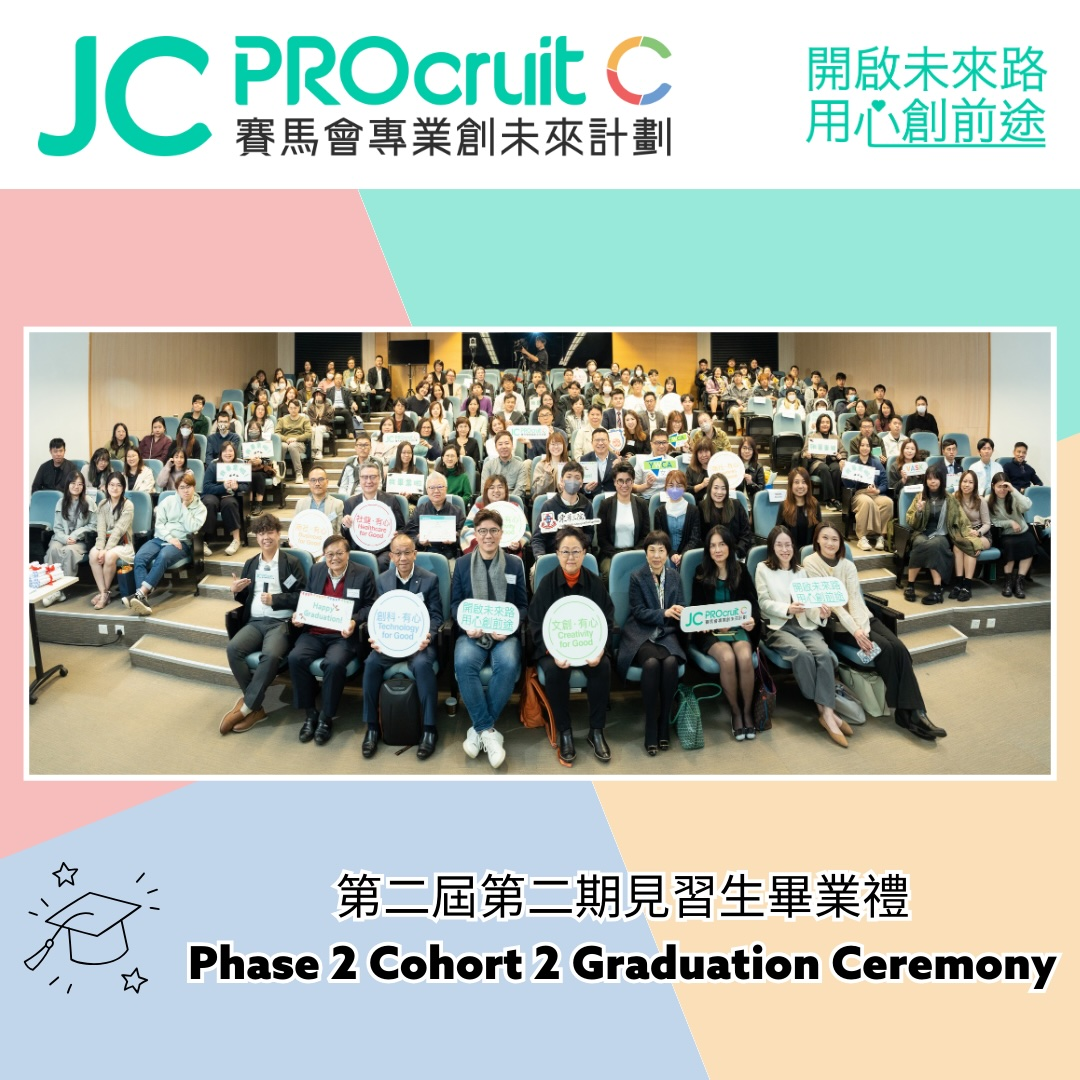 A big applause to the 131 trainees who completed the one-year JC PROcruit C Professional Traineeship Programme,
who are now embarking on their new career journeys!
A big applause to the 131 trainees who completed the one-year JC PROcruit C Professional Traineeship Programme,
who are now embarking on their new career journeys! The programme would not have been successful without professional advice and support from The Hong Kong Jockey Club, industry convenors, and education and training partners along the journey. Trainee graduates celebrated their accomplishments together with their employers at the graduation ceremony. Prof. Winton Au, deputy director of the Centre for Youth Studies, also shared encouraging data, which revealed that nearly 90% of trainees agreed that the programme has effectively helped them with the school-to-workplace transition, which is highly gratifying news! |
|
|
Gender Research Centre
Marriage Unbound: State Law, Power, and Inequality in Contemporary China 10:30–11:30 | 11 October 2023 | Online |
|
|
Speakers
Prof. Ke Li |
Assistant Professor, Department of Political Science, John Jay College of the City University of New York, U.S. |
|
Moderator
Prof. Ling Han |
Assistant Professor, Gender Studies Programme, CUHK
|
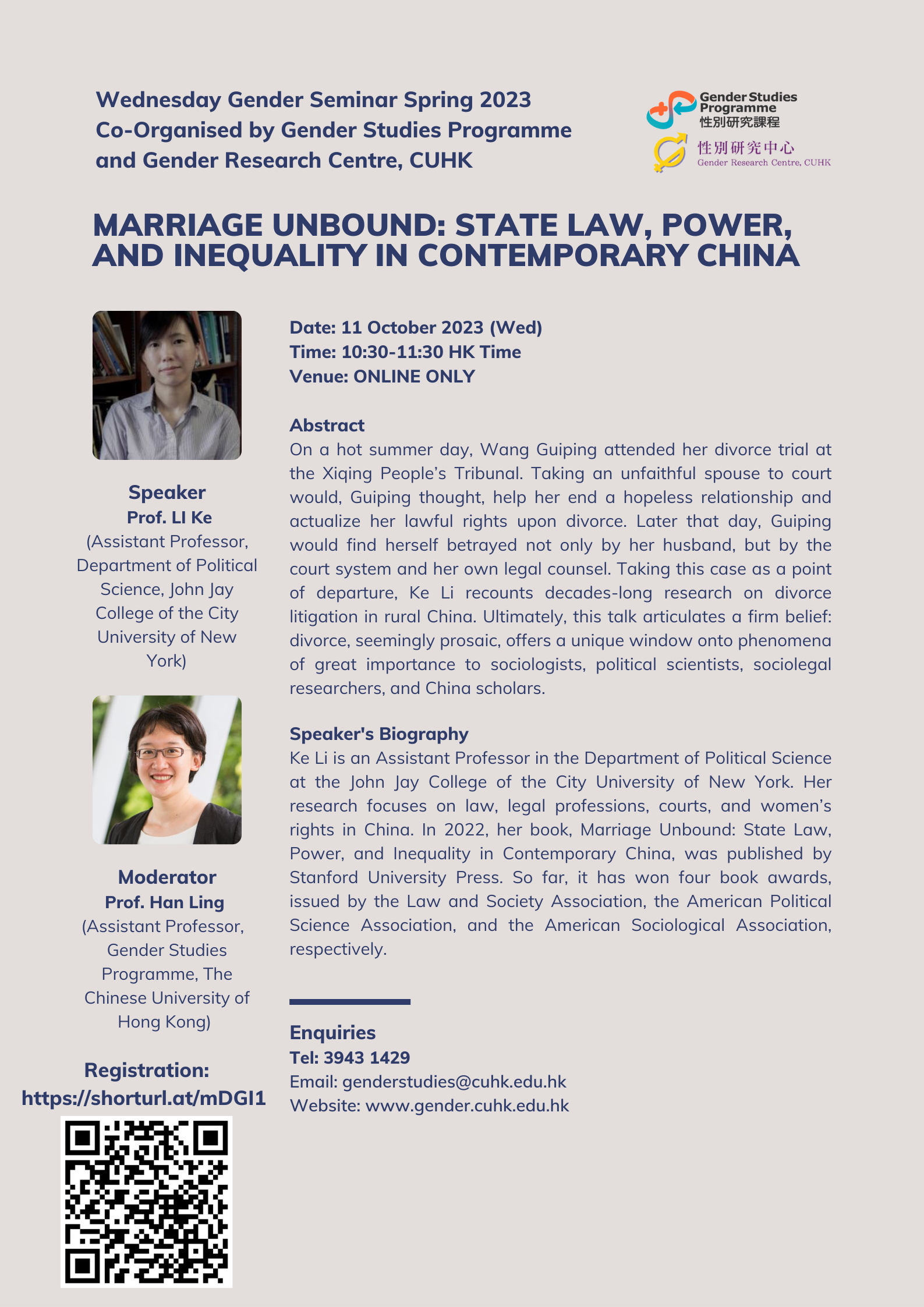 On a hot summer’s day, Wang Guiping attended her divorce trial at the Xiqing People’s Tribunal.
Taking an unfaithful spouse to court would, Guiping thought, help her end a hopeless relationship and actualize her lawful rights upon divorce.
Later that day, Guiping would find herself betrayed not only by her husband, but by the court system and her own legal counsel.
Taking this case as a point of departure, Prof. Li recounts decades-long research on divorce litigation in rural China.
Ultimately, this talk articulates a firm belief: Divorce, seemingly prosaic,
offers a unique window onto phenomena of great importance to sociologists, political scientists, sociolegal researchers, and China scholars.
On a hot summer’s day, Wang Guiping attended her divorce trial at the Xiqing People’s Tribunal.
Taking an unfaithful spouse to court would, Guiping thought, help her end a hopeless relationship and actualize her lawful rights upon divorce.
Later that day, Guiping would find herself betrayed not only by her husband, but by the court system and her own legal counsel.
Taking this case as a point of departure, Prof. Li recounts decades-long research on divorce litigation in rural China.
Ultimately, this talk articulates a firm belief: Divorce, seemingly prosaic,
offers a unique window onto phenomena of great importance to sociologists, political scientists, sociolegal researchers, and China scholars.
|
|
|
Online Sexual Harassment, Harm, and Relationality
12:30–14:00 | 18 October 2023 | Room 109, Chen Kou Bun Building, CUHK |
|
|
Speakers
Dr Tangi Yip |
Postdoctoral Fellow, Gender Research Centre, HKIAPS, CUHK
|
|
Prof. Susanne Y. P. Choi |
Co-Director, Gender Research Centre, HKIAPS, CUHK
|
|
Moderator
Prof. Jing Song |
Associate Professor, Gender Studies Programme, CUHK
|
|
Co-organizer
Gender Studies Programme, CUHK |
|
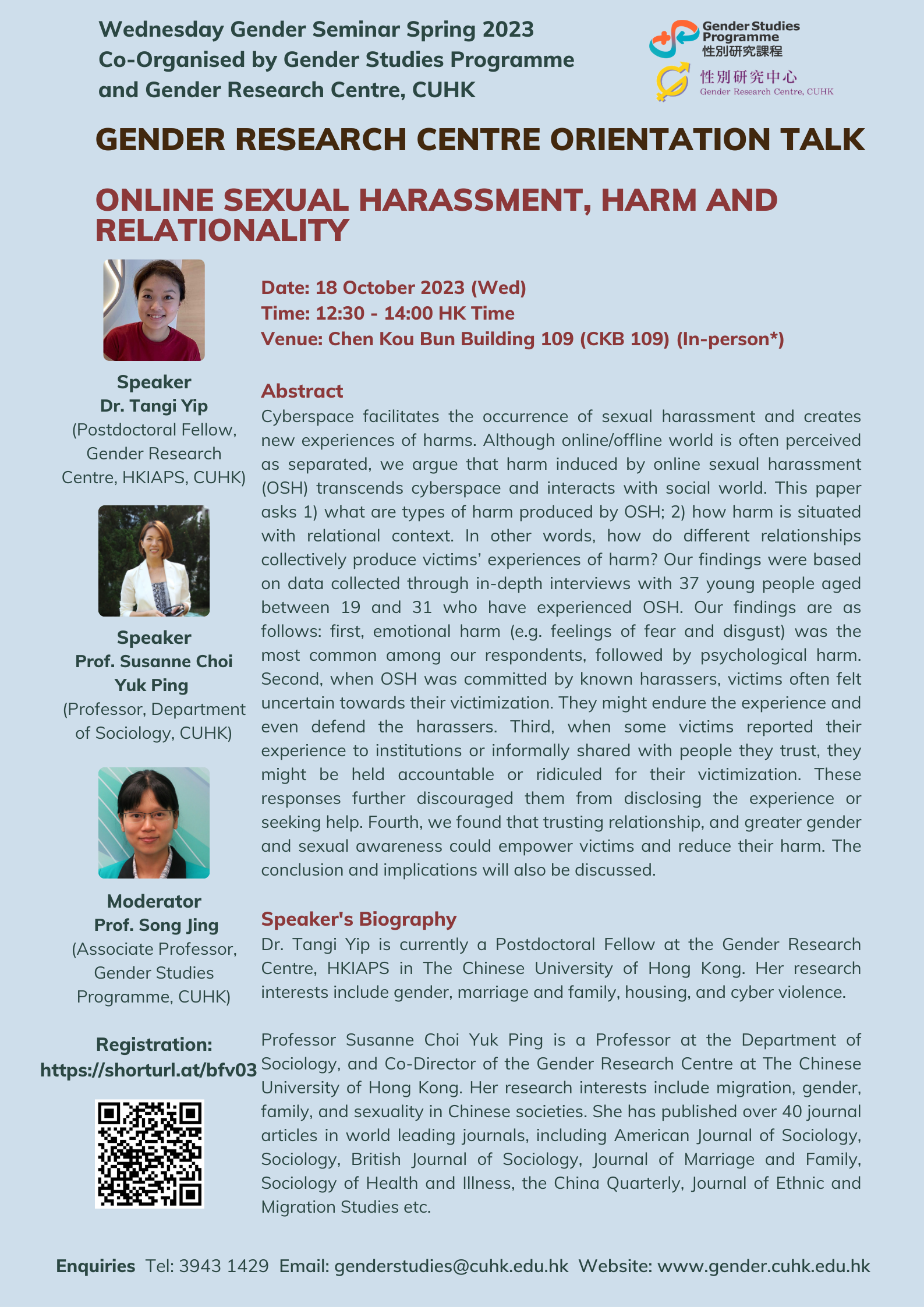 Cyberspace facilitates the occurrence of sexual harassment and creates new experiences of harms.
Although the online/offline worlds are often perceived as separate,
the Speakers argue that the harm induced by online sexual harassment (OSH) transcends cyberspace and interacts with the social world.
Cyberspace facilitates the occurrence of sexual harassment and creates new experiences of harms.
Although the online/offline worlds are often perceived as separate,
the Speakers argue that the harm induced by online sexual harassment (OSH) transcends cyberspace and interacts with the social world.In this seminar, Dr Tangi Yip asked: What are types of harm are produced by OSH and how is harm situated in a relational context? In other words, how do different relationships collectively produce victims’ experiences of harm? The research findings were based on data collected through in-depth interviews with 37 young people aged between 19 and 31 who have experienced OSH. The findings are as follows: first, emotional harm (e.g., feelings of fear and disgust) was the most common form of harm among our respondents, followed by psychological harm. Second, when OSH was committed by known harassers, victims often felt uncertain about their victimization. They might put up with the experience and even defend the harassers. Third, when some victims reported their experience to institutions or informally shared it with people whom they trusted, they were sometimes held accountable or ridiculed for their victimization. These responses further discouraged them from disclosing the experience or seeking help. Fourth, the research team found that trusting relationships, and greater gender and sexual awareness could empower victims and reduce their harm. The conclusion and implications were discussed. |
|
|
Doing Gender and Displaying Gender as A Strategy: An Empirical Study of Female Entrepreneurs
12:30–14:00 | 29 November 2023 | Online |
||
|
Speaker
Prof. Xiaoying Qi |
Associate Professor in Sociology, Australian Catholic University
|
|
|
Moderator
Prof. Susanne Y. P. Choi |
Co-Director, Gender Research Centre, HKIAPS, CUHK
|
|
|
Co-organizer
Gender Studies Programme, CUHK |
||
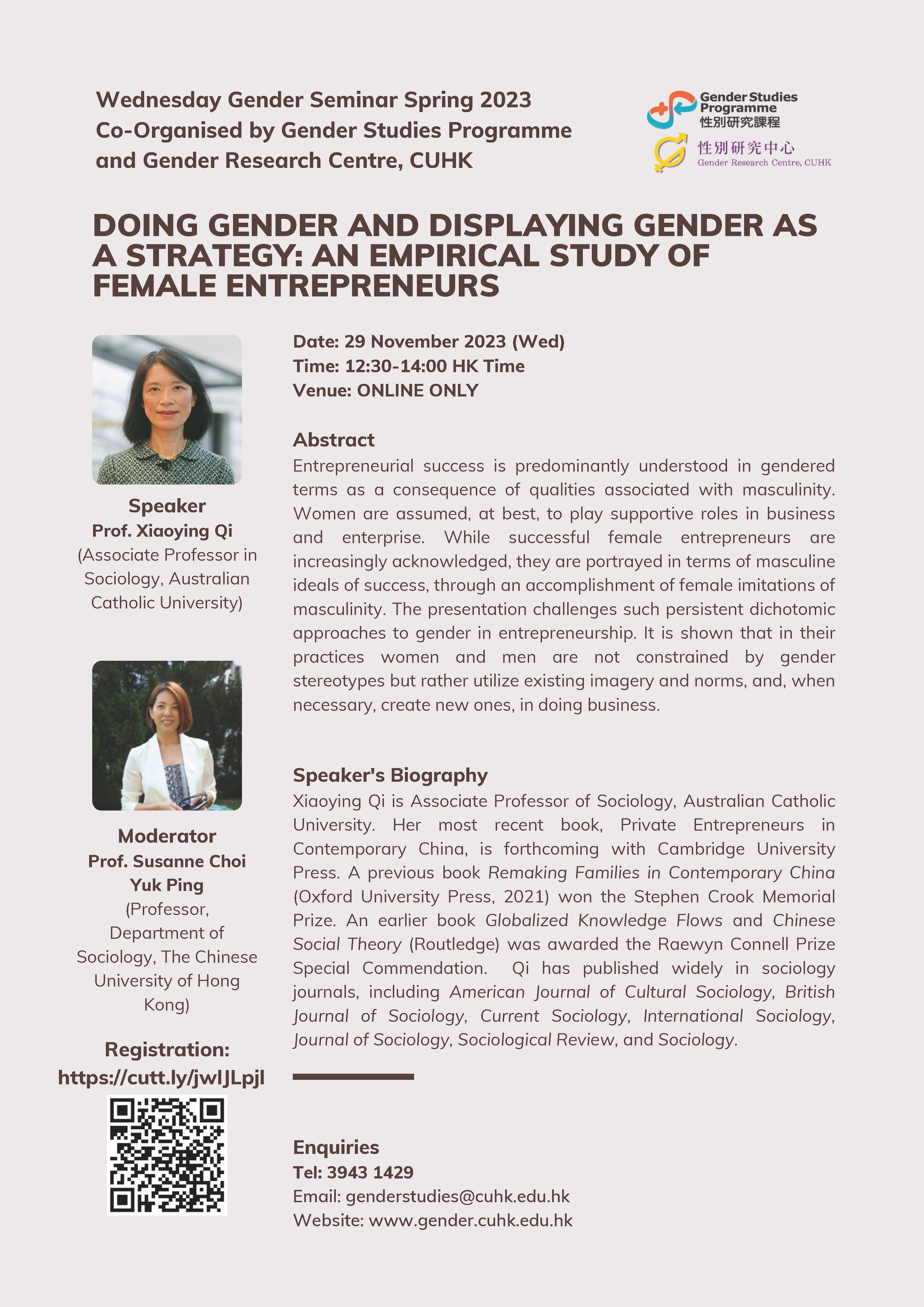 Entrepreneurial success is predominantly understood in gendered terms as a consequence of qualities associated with masculinity.
Women are assumed, at best, to play supportive roles in business and enterprise.
While successful female entrepreneurs are increasingly acknowledged, they are portrayed in terms of masculine ideals of success,
through the accomplishment of female imitations of masculinity.
Entrepreneurial success is predominantly understood in gendered terms as a consequence of qualities associated with masculinity.
Women are assumed, at best, to play supportive roles in business and enterprise.
While successful female entrepreneurs are increasingly acknowledged, they are portrayed in terms of masculine ideals of success,
through the accomplishment of female imitations of masculinity. The presentation challenges such persistent dichotomic approaches to gender in entrepreneurship. It shows that in their practices women and men are not constrained by gender stereotypes but rather utilize existing imagery and norms and, when necessary, create new ones, in doing business. |
||
|
How Did East Asia Overtake South Asia on Gender?
10:30–11:30 | 7 February 2024 | LT2, UG/F, Sino Building, CUHK |
|
|
Speaker
Dr Alice Evans |
Senior Lecturer, Department of International Development, School of Global Affairs, Faculty of Social Science & Public Policy, King’s College London, UK |
|
Moderator
Prof. Susanne Y. P. Choi |
Co-Director, Gender Research Centre, HKIAPS, CUHK
|
|
Co-organizer
Gender Studies Programme, CUHK |
|
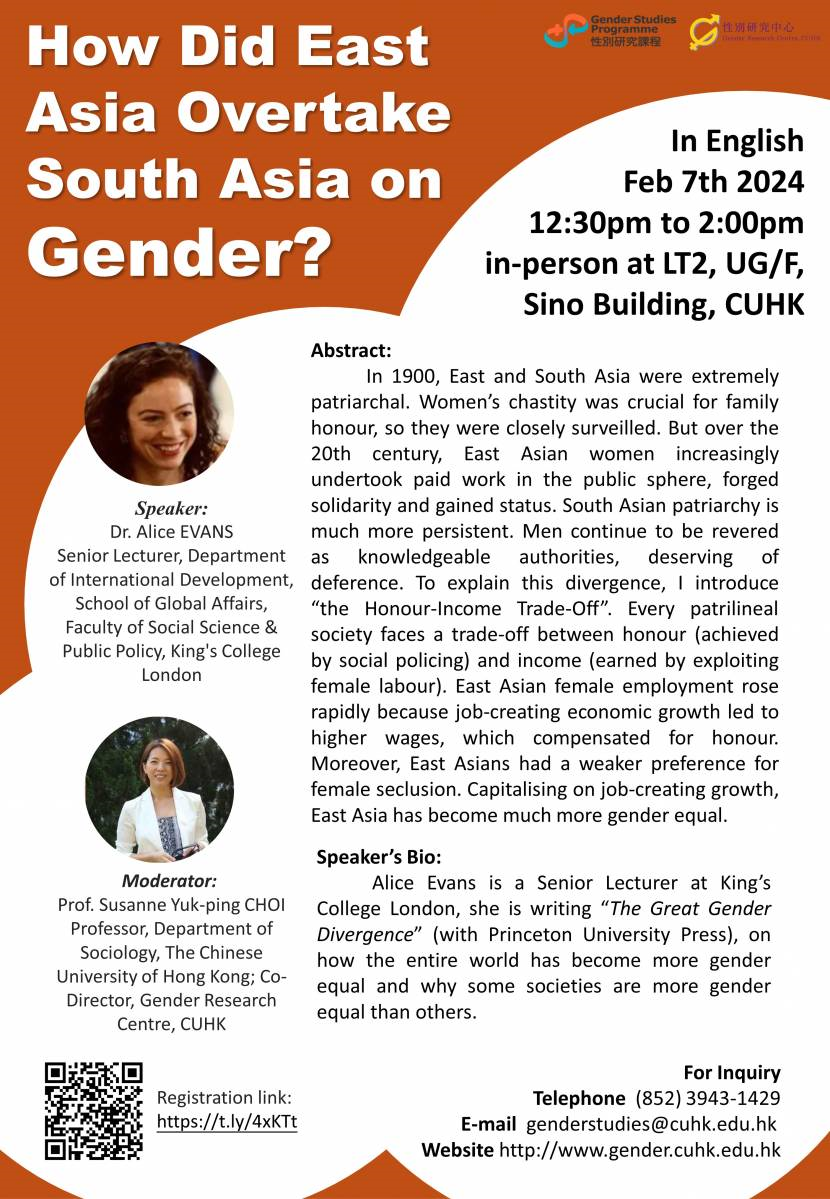 The seminar delved into Prof. Li’s extensive research on divorce litigation in rural China,
using a compelling case as a starting point.
Prof. Li’s work sheds light on the profound sociological and political implications of divorce,
illustrating how it offers a unique perspective on issues of great significance.
Her recent book, Marriage Unbound: State Law, Power, and Inequality in Contemporary China has received accolades from prestigious associations,
including the Law and Society Association, the American Political Science Association, and the American Sociological Association.
Ultimately, this seminar articulates a firm belief:
Divorce, seemingly prosaic,
offers a unique window onto phenomena of great importance to sociologists,
political scientists, sociolegal researchers, and China scholars.
The seminar delved into Prof. Li’s extensive research on divorce litigation in rural China,
using a compelling case as a starting point.
Prof. Li’s work sheds light on the profound sociological and political implications of divorce,
illustrating how it offers a unique perspective on issues of great significance.
Her recent book, Marriage Unbound: State Law, Power, and Inequality in Contemporary China has received accolades from prestigious associations,
including the Law and Society Association, the American Political Science Association, and the American Sociological Association.
Ultimately, this seminar articulates a firm belief:
Divorce, seemingly prosaic,
offers a unique window onto phenomena of great importance to sociologists,
political scientists, sociolegal researchers, and China scholars.
|
|
|
Gender Inequality in Academia:
Career Development and Promotion Timelines in a University in Hong Kong 12:30–14:00 | 21 February 2024 | LT2, UG/F, Sino Building, CUHK |
|
|
Speaker
Prof. Sara H. Zhong |
Associate Director, Chinese Law Programme, HKIAPS, CUHK
|
|
Moderator
Prof. Haijing Dai |
Co-Director, Centre for Chinese Family Studies, HKIAPS
|
|
Co-organizer
Gender Studies Programme, CUHK |
|
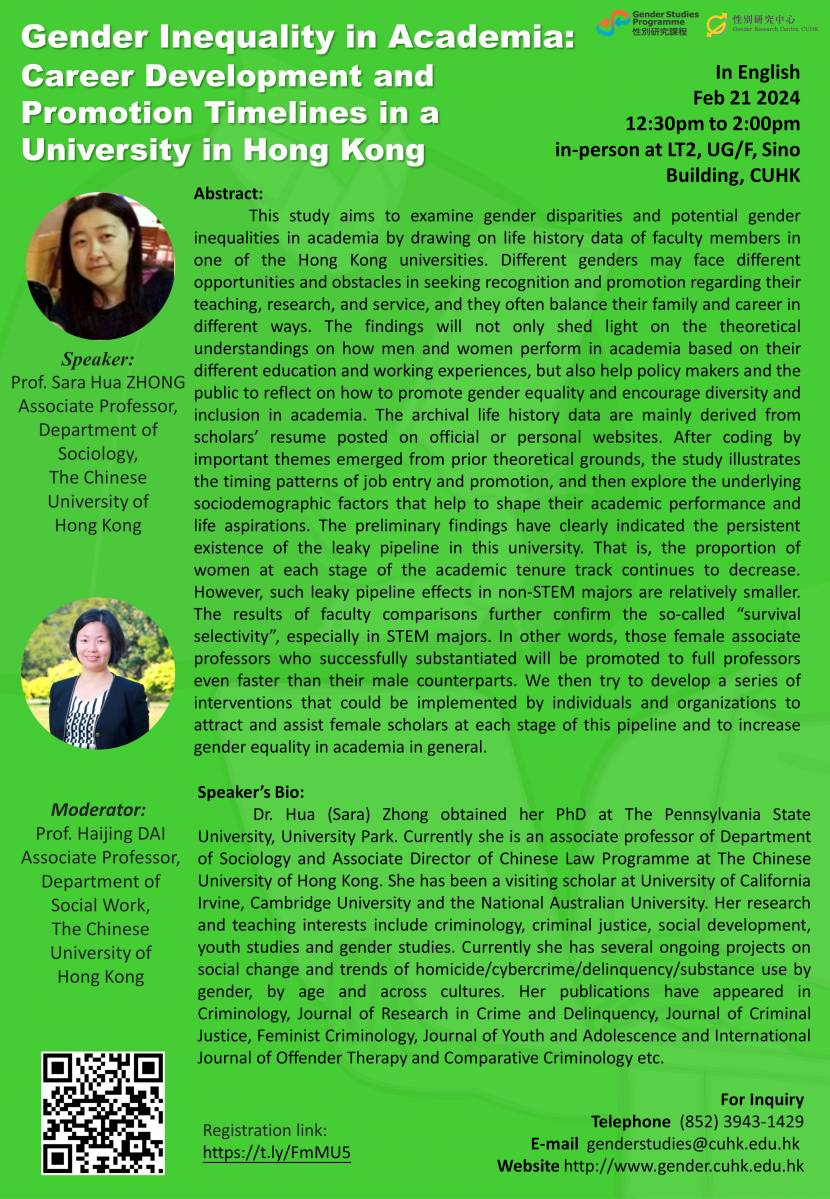 This seminar aims to examine gender disparities and potential gender inequalities in academia by drawing on the life history data of faculty members in a university in Hong Kong.
Different genders may encounter different opportunities and obstacles in seeking recognition and promotion for their teaching, research, and service,
and they often balance their family and career in different ways.
This seminar aims to examine gender disparities and potential gender inequalities in academia by drawing on the life history data of faculty members in a university in Hong Kong.
Different genders may encounter different opportunities and obstacles in seeking recognition and promotion for their teaching, research, and service,
and they often balance their family and career in different ways.The findings will not only shed light on theoretical understandings of how men and women perform in academia based on their different educational and working experiences, but also help policy makers and the public to reflect on how to promote gender equality and encourage diversity and inclusion in academia. |
|
|
When Digital Platforms Become Migrant Destinations:
A Case Study of Rural Women’s Creative Entrepreneurship in the Digital China 12:30–14:00 | 28 February 2024 | LT2, UG/F, Sino Building, CUHK |
|
|
Speaker
Ms Danchen Liu |
MPhil Student, Gender Studies Programme and Department of Sociology, CUHK |
|
Moderator
Prof. Ling Han |
Assistant Professor, Gender Studies Programme, CUHK
|
|
Co-organizer
Gender Studies Programme, CUHK |
|
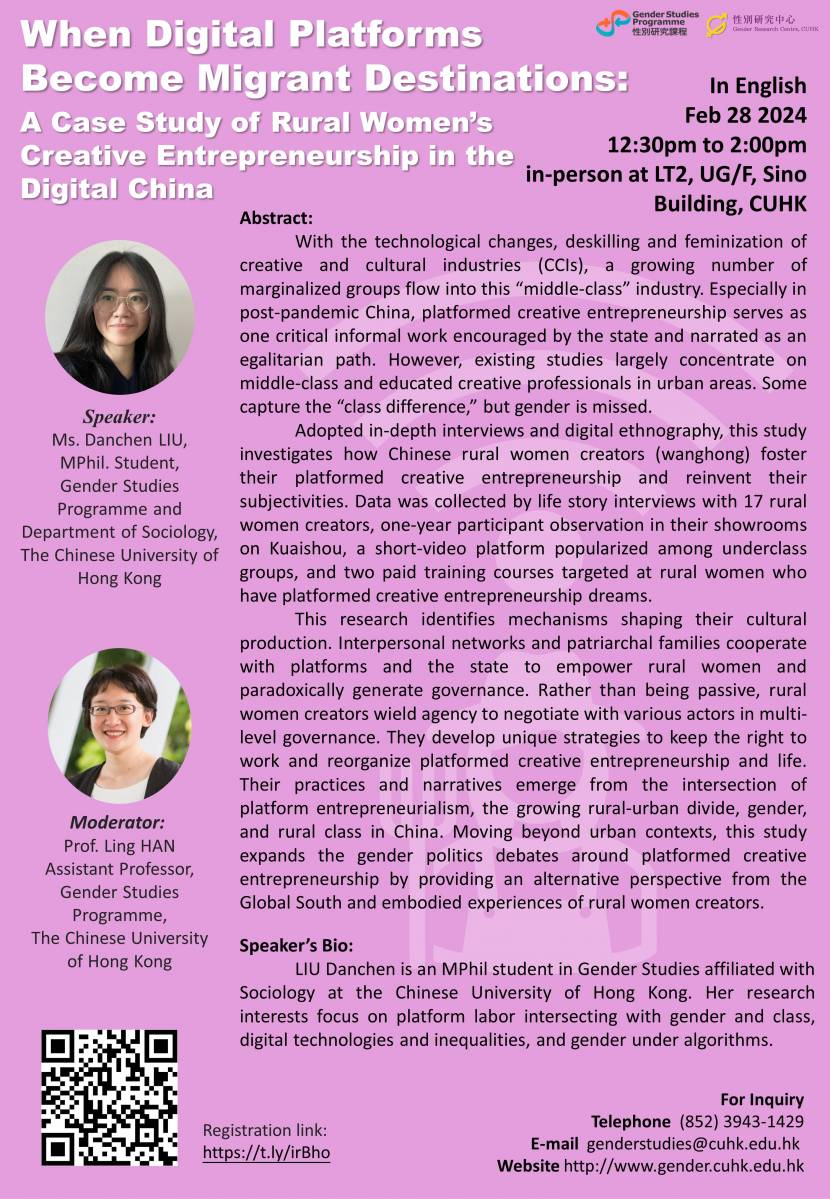 Adopting the approaches of in-depth interviews and digital ethnography,
this seminar investigates how Chinese rural women creators (wanghong) foster their creative entrepreneurship over digital platforms and reinvent their subjectivities.
Data were collected through life story interviews with 17 rural women creators,
one-year participant observations of their showrooms on Kuaishou (a short-video platform popular among underclass groups),
and two paid training courses targeted at rural women who have pursued their dreams of conducting creative entrepreneurship over digital platforms.
Adopting the approaches of in-depth interviews and digital ethnography,
this seminar investigates how Chinese rural women creators (wanghong) foster their creative entrepreneurship over digital platforms and reinvent their subjectivities.
Data were collected through life story interviews with 17 rural women creators,
one-year participant observations of their showrooms on Kuaishou (a short-video platform popular among underclass groups),
and two paid training courses targeted at rural women who have pursued their dreams of conducting creative entrepreneurship over digital platforms.This research identifies mechanisms shaping their cultural production. Interpersonal networks and patriarchal families cooperate with digital platforms and the state to empower rural women and, paradoxically, generate a form of governance. Rather than being passive, rural women creators wield agency to negotiate with various actors in multiple levels of governance. They develop unique strategies to retain the right to work, and reorganize platformed creative entrepreneurship and life. Their practices and narratives emerge from the intersection of platform entrepreneurialism, a growing rural-urban divide, gender, and the rural class in China. Moving beyond urban contexts, this research expands gender politics debates on platformed creative entrepreneurship by providing an alternative perspective from the Global South through the embodied experiences of rural women creators. |
|
|
Urban and Rural Context of Gender Inequality and Adolescent Dating Violence in China:
Tilting Toward a Feminist Poststructural Perspective 12:30–14:00 | 6 March 2024 | LT2, UG/F, Sino Building, CUHK |
|
|
Speaker
Prof. Nicole W. T. Cheung |
Associate Professor, Department of Sociology, CUHK
|
|
Moderator
Prof. Jing Song |
Associate Professor, Gender Studies Programme, CUHK
|
|
Co-organizer
Gender Studies Programme, CUHK |
|
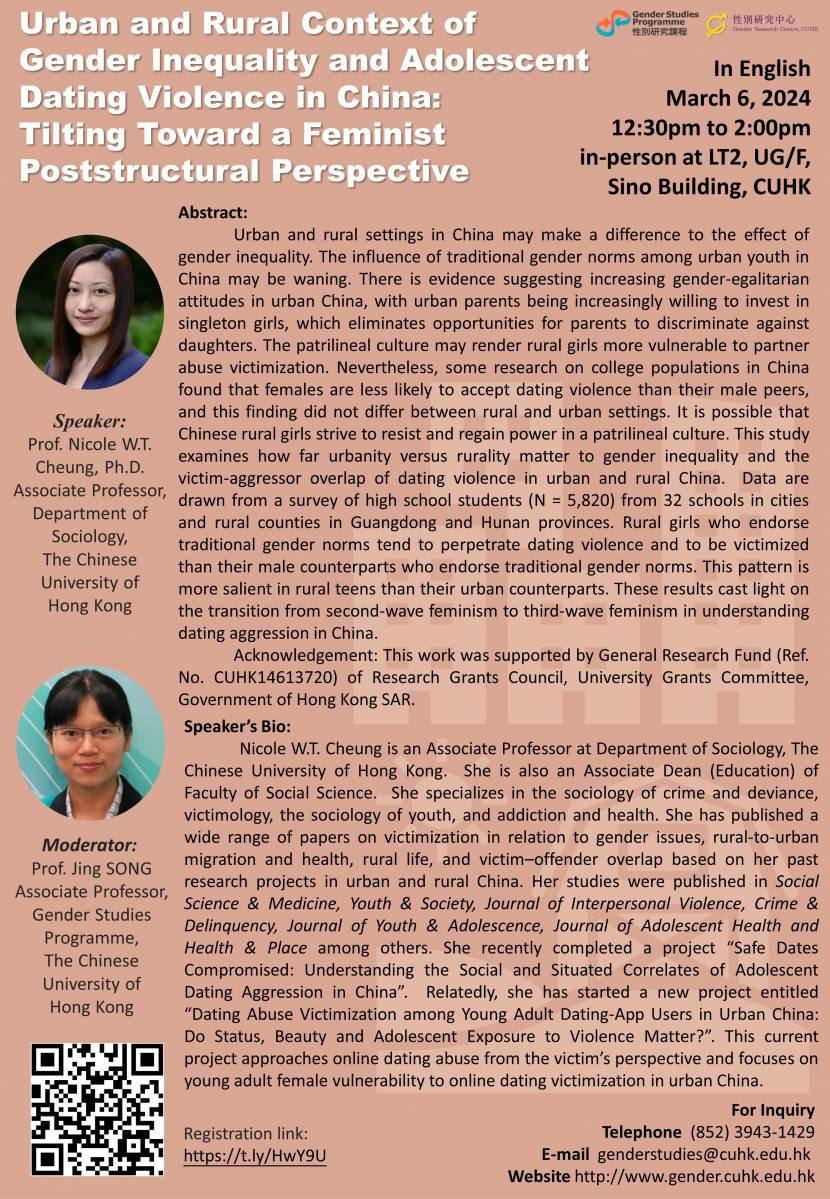 Urban and rural settings in China may make a difference to the effect of gender inequality.
The influence of traditional gender norms among urban youth in China may be waning.
There is evidence suggesting that gender-egalitarian attitudes are on the rise in urban China,
with urban parents being increasingly willing to invest in singleton girls,
which eliminates opportunities for parents to discriminate against daughters.
A patrilineal culture may make rural girls more vulnerable to victimization from partner abuse.
Nevertheless, some research on college populations in China found that females are less likely to accept dating violence than their male peers,
and this finding did not differ between rural and urban settings.
It is possible that Chinese rural girls are striving to resist the constraints placed upon them by a patrilineal culture, and to regain power.
Urban and rural settings in China may make a difference to the effect of gender inequality.
The influence of traditional gender norms among urban youth in China may be waning.
There is evidence suggesting that gender-egalitarian attitudes are on the rise in urban China,
with urban parents being increasingly willing to invest in singleton girls,
which eliminates opportunities for parents to discriminate against daughters.
A patrilineal culture may make rural girls more vulnerable to victimization from partner abuse.
Nevertheless, some research on college populations in China found that females are less likely to accept dating violence than their male peers,
and this finding did not differ between rural and urban settings.
It is possible that Chinese rural girls are striving to resist the constraints placed upon them by a patrilineal culture, and to regain power.This seminar examines how far urbanity versus rurality matters to gender inequality, and explores the victim-aggressor overlap of dating violence in urban and rural China. Data are drawn from a survey of high school students (N = 5,820) from 32 schools in cities and rural counties in Guangdong and Hunan provinces. Rural girls who endorse traditional gender norms are more likely to perpetrate dating violence and to be victimized than their male counterparts who endorse traditional gender norms. This pattern is more salient among rural teens than among their urban counterparts. These results cast light on the transition from second-wave feminism to third-wave feminism in understanding dating aggression in China. |
|
|
Complicating the Migrant Maternal Imaginary: Valuation and Parenting Experiences of
College-Educated Chinese Stay-at-Home Mothers in Singapore 12:30–14:00 | 13 March 2024 | Online |
|
|
Speaker
Prof. Zheng Mu |
Assistant Professor, Department of Sociology and Anthropology, National University of Singapore |
|
Moderator
Prof. Jing Song |
Associate Professor, Gender Studies Programme, CUHK
|
|
Co-organizer
Gender Studies Programme, CUHK |
|
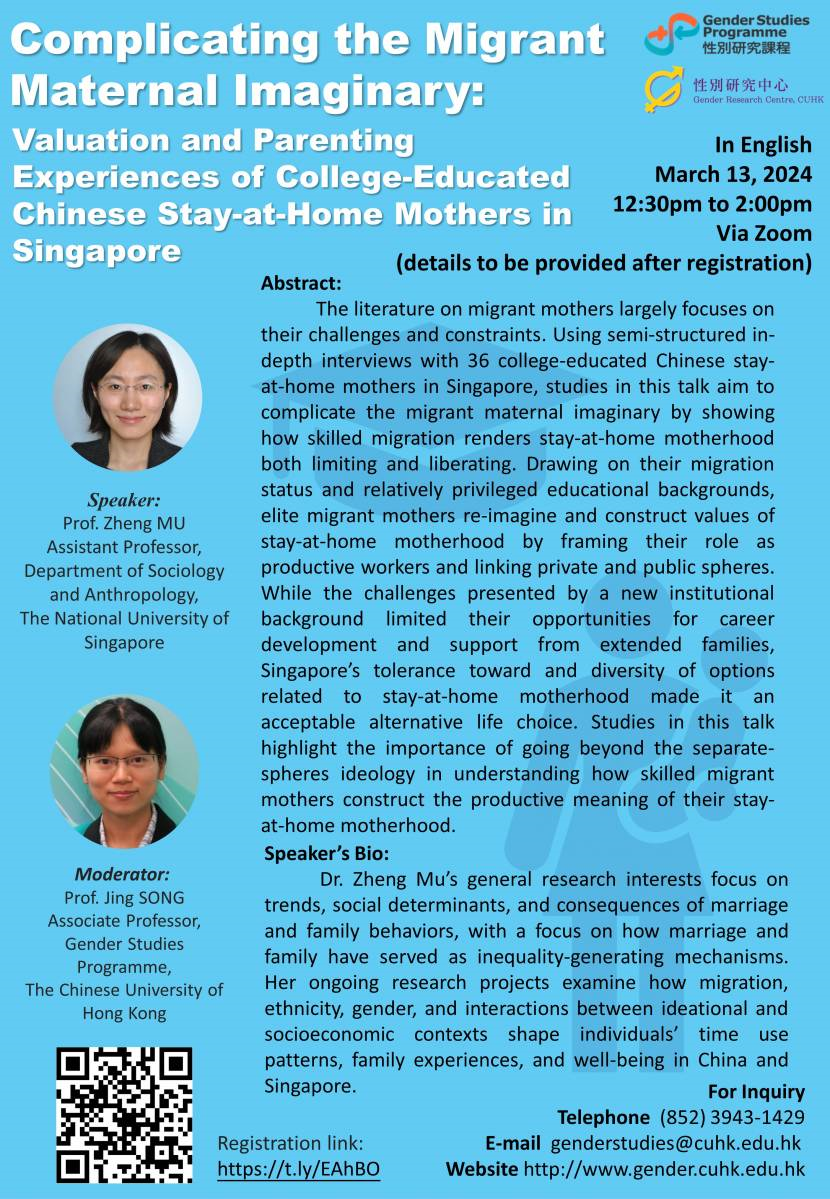 The literature on migrant mothers largely focuses on their challenges and constraints.
Through semi-structured in-depth interviews with 36 college-educated Chinese stay-at-home mothers in Singapore,
the studies discussed in this talk add complexity to the image of migrant mothers by showing how skilled migration makes stay-at-home motherhood both limiting and liberating.
The literature on migrant mothers largely focuses on their challenges and constraints.
Through semi-structured in-depth interviews with 36 college-educated Chinese stay-at-home mothers in Singapore,
the studies discussed in this talk add complexity to the image of migrant mothers by showing how skilled migration makes stay-at-home motherhood both limiting and liberating.Drawing on their migration status and relatively privileged educational backgrounds, elite migrant mothers re-imagine and construct values of stay-at-home motherhood by framing their role as productive workers and linking the private and public spheres. While the challenges presented by a new institutional background limited their opportunities for career development and support from extended families, Singapore’s tolerance toward and diversity of options related to stay-at-home motherhood made it an acceptable alternative life choice. Studies in this talk highlight the importance of going beyond the separate-spheres ideology in understanding how skilled migrant mothers construct the productive meaning of their stay-at-home motherhood. |
|
|
Research Centre for Urban and Regional Development
Seminar on “Gender Perspectives in Urban Planning: The Case of Barcelona” 16:30–18:00 | 18 Jan 2024 | Online |
|
|
Speaker
Dr Chunxian Zhang |
Assistant Professor, Department of Land Management, Zhejiang University, China |
|
Co-organizer
Department of Geography and Resource Management, CUHK |
|
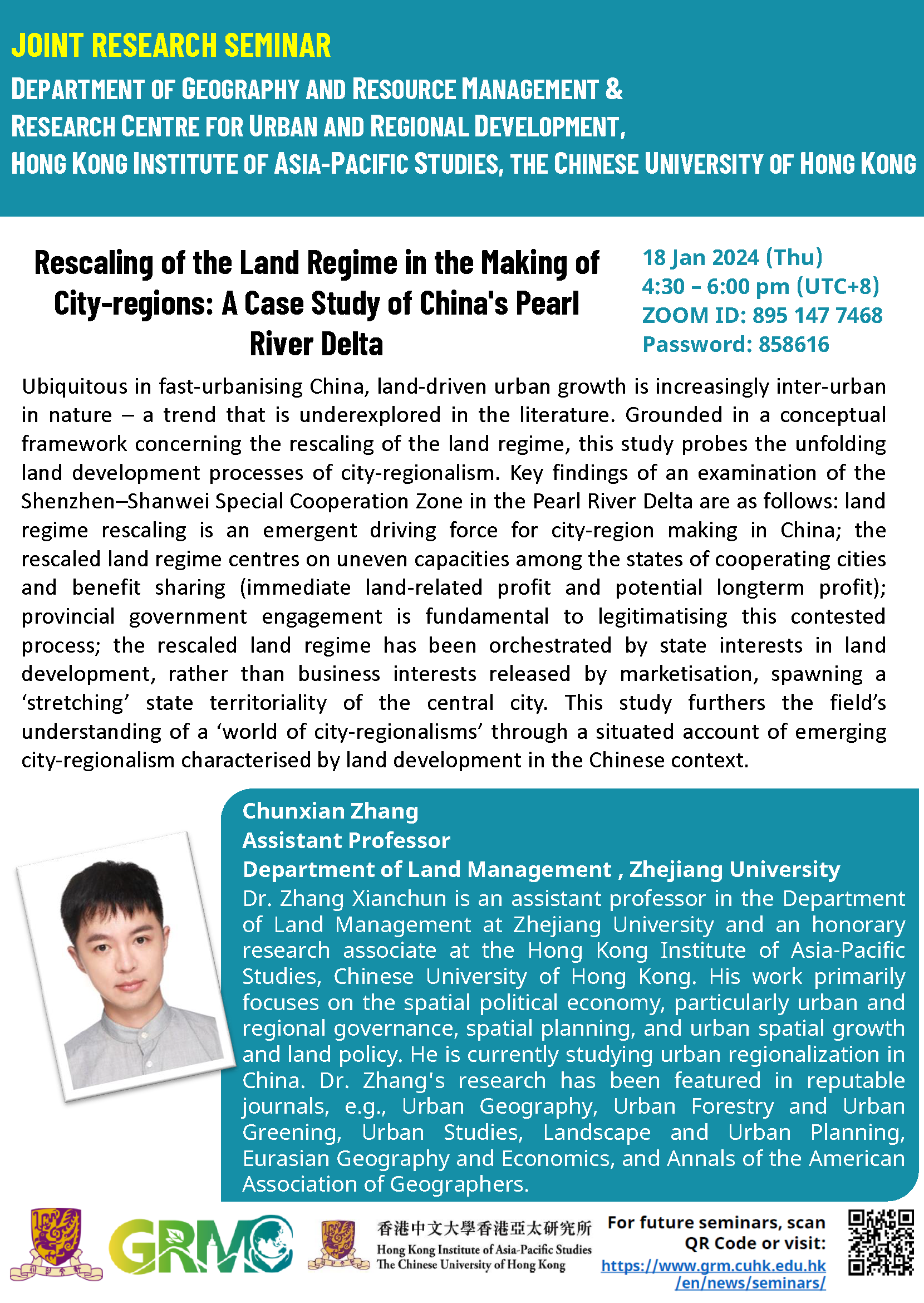 Ubiquitous in rapidly-urbanizing China, land-driven urban growth is increasingly inter-urban in nature – a trend that is underexplored in the literature.
Grounded in a conceptual framework concerning the rescaling of the land regime,
this study probes the unfolding land development processes of city-regionalism.
Ubiquitous in rapidly-urbanizing China, land-driven urban growth is increasingly inter-urban in nature – a trend that is underexplored in the literature.
Grounded in a conceptual framework concerning the rescaling of the land regime,
this study probes the unfolding land development processes of city-regionalism.The key findings of an examination of the Shenzhen–Shanwei Special Cooperation Zone in the Pearl River Delta are as follows: (i) land regime rescaling is an emergent driving force in the making of city-regions in China; (ii) a rescaled land regime centres on uneven capacities among cooperating cities and on the sharing of benefits (immediate land-related profits and potential long-term profits); (iii) provincial government engagement is fundamental to legitimatizing this contested process; and (iv) the rescaled land regime has been orchestrated by state interests in land development, rather than by business interests released by marketization, spawning a “stretching” of the state territoriality of the central city. This study furthers understanding in the field of a “world of city-regionalisms” through a situated account of emerging city-regionalism characterized by land development in the Chinese context. |
|
|
Chinese Law Programme
香港特別行政區進入緊急狀態的憲制安排 (The Constitutional Arrangements for the Declaration of a State of Emergency in the Hong Kong SAR) 16:00–17:30 | 27 October 2023 | Room 505, Esther Lee Building, CUHK |
|
|
Speaker
Prof. Hongchang Jiao |
Professor, China University of Political Science and Law |
|
Moderator
Prof. Chao Xi |
Director, Chinese Law Programme, HKIAPS |
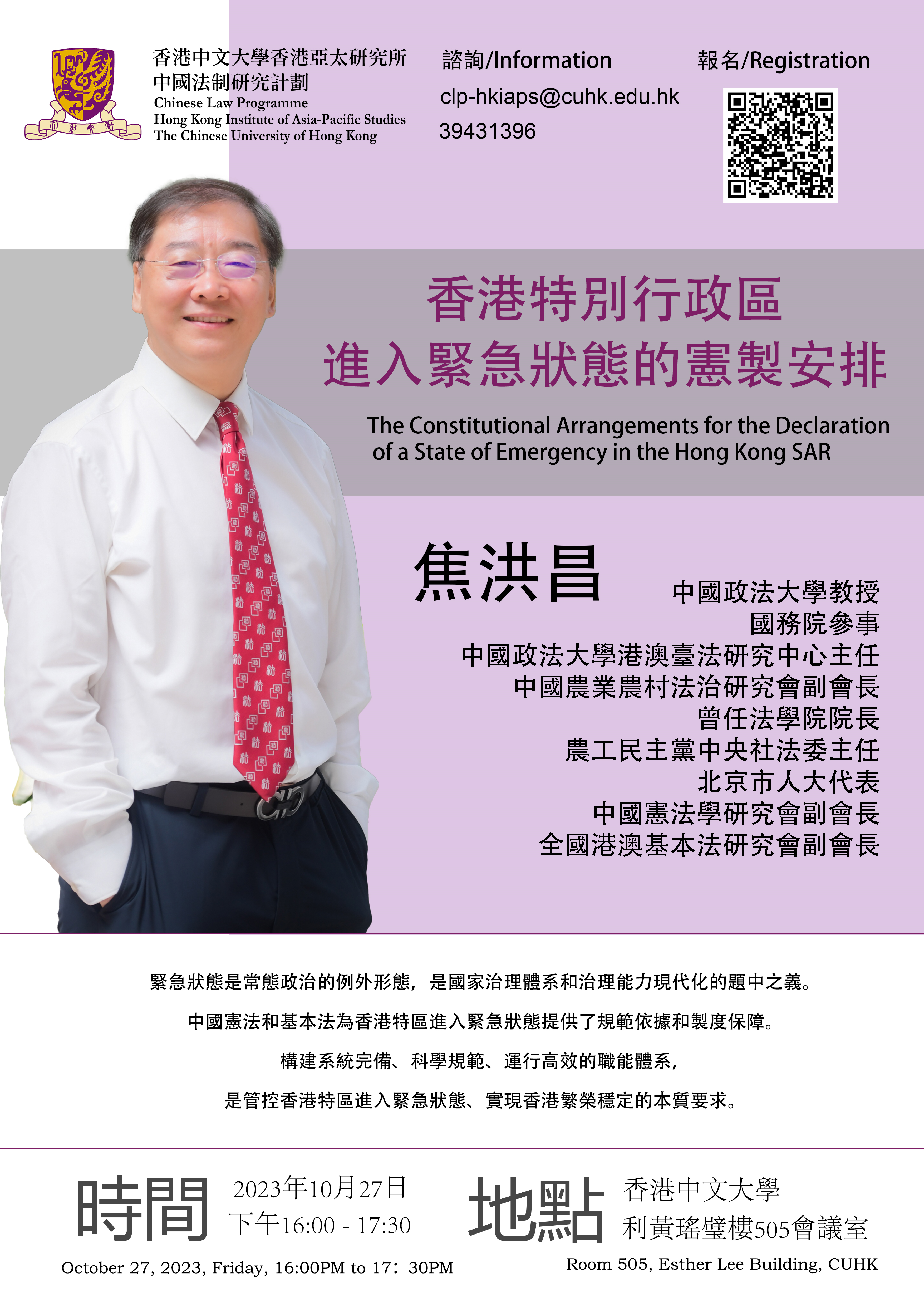 緊急狀態是常態政治的例外形態,是國家治理體系和治理能力現代化的題中之義。
中國憲法和基本法為香港特區進入緊急狀態提供了規範依據和制度保障。
構建系統完備、科學規範、運行高效的職能體系,是管控香港特區進入緊急狀態、實現香港繁榮穩定的本質要求。
緊急狀態是常態政治的例外形態,是國家治理體系和治理能力現代化的題中之義。
中國憲法和基本法為香港特區進入緊急狀態提供了規範依據和制度保障。
構建系統完備、科學規範、運行高效的職能體系,是管控香港特區進入緊急狀態、實現香港繁榮穩定的本質要求。 |
|
|
法治的複調變奏:香港語境 (Polyphonic Variations of the Rule of Law Hong Kong Context)
16:00–17:30 | 25 January 2024 | Room 505, Esther Lee Building, CUHK |
|
|
Speaker
Prof. Guangming Han |
Associate Professor, School of Law, Sun Yat-sen University, China |
|
Moderator
Prof. Chao Xi |
Director, Chinese Law Programme, HKIAPS |
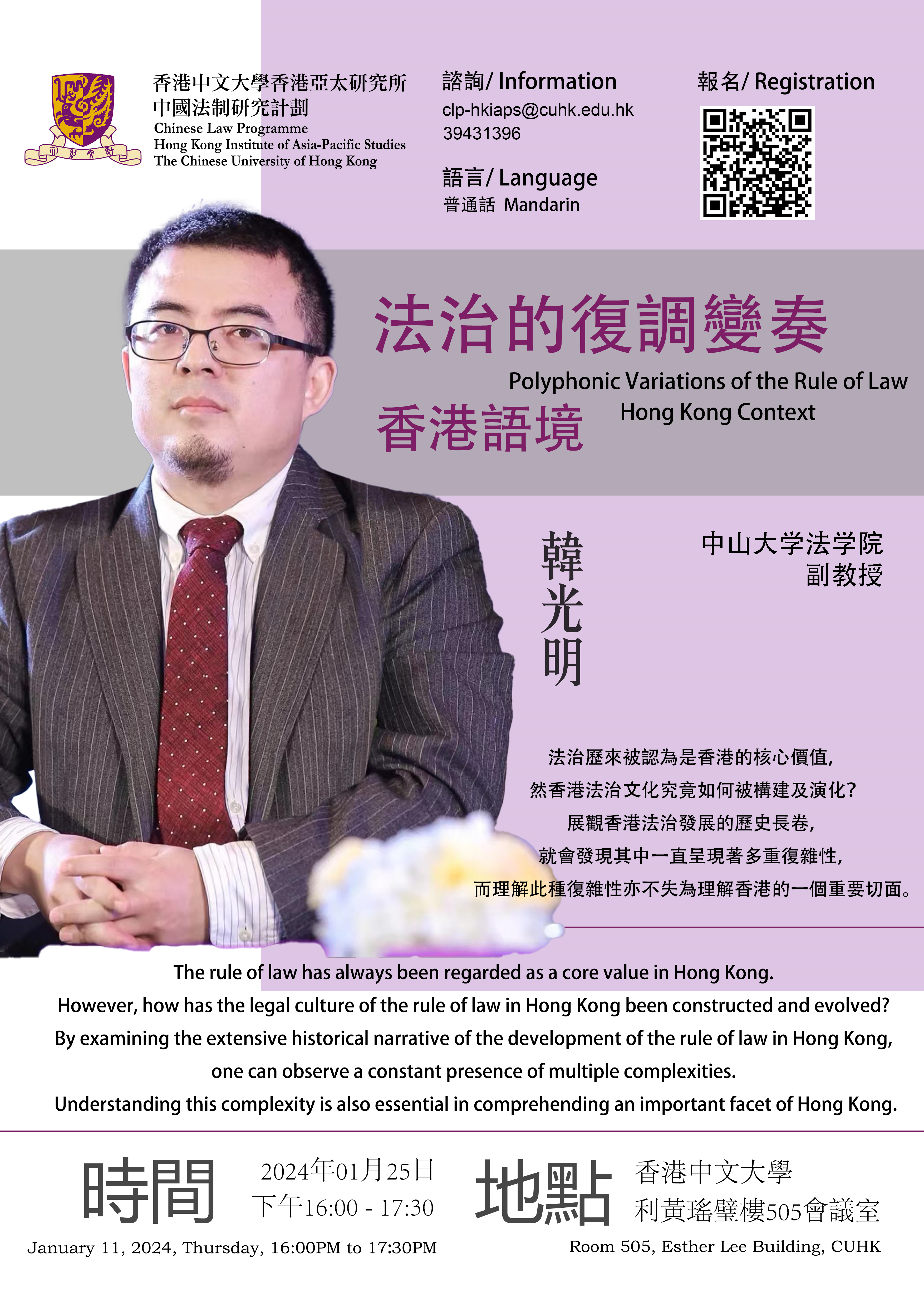 The rule of law has always been regarded as a core value in Hong Kong.
However, how has the legal culture of the rule of law in Hong Kong been constructed and evolved?
By examining the extensive historical narrative of the development of the rule of law in Hong Kong,
one can observe a constant presence of multiple complexities.
Understanding this complexity is also essential in comprehending an important facet of Hong Kong.
The rule of law has always been regarded as a core value in Hong Kong.
However, how has the legal culture of the rule of law in Hong Kong been constructed and evolved?
By examining the extensive historical narrative of the development of the rule of law in Hong Kong,
one can observe a constant presence of multiple complexities.
Understanding this complexity is also essential in comprehending an important facet of Hong Kong. |
|
|
憲法的最高法律效力及其與基本法的關係
(The Highest Legal Effect of the Constitution and Its Relationship with the Basic Law)
12:30–14:00 | 14 March 2024 | Room 505, Esther Lee Building, CUHK |
|
|
Speaker
Prof. Yizhou Ye |
Associate Professor, School of Law, Sun Yat-sen University, China |
|
Moderator
Prof. Chao Xi |
Director, Chinese Law Programme, HKIAPS |
 我國《憲法》與港澳兩部《基本法》的關係是學界長久以來關注和討論的重要研究主題。
毫無疑問,一國憲法在該國法律體系之內具有最高效力,但與基本法之間的具體關係是什麼,是一個值得探討的學理問題。
本次講座將嘗試通過在法理層面澄清關鍵概念的方式來闡明作為具有最高效力的憲法與基本法的關係。
我國《憲法》與港澳兩部《基本法》的關係是學界長久以來關注和討論的重要研究主題。
毫無疑問,一國憲法在該國法律體系之內具有最高效力,但與基本法之間的具體關係是什麼,是一個值得探討的學理問題。
本次講座將嘗試通過在法理層面澄清關鍵概念的方式來闡明作為具有最高效力的憲法與基本法的關係。 |
|
|
|
|
| HKIAPS | Contact Us | Disclaimer | Privacy Policy | |
| Copyright © 2024 Hong Kong Institute of Asia-Pacific Studies, The Chinese University of Hong Kong. All Rights Reserved. | |

